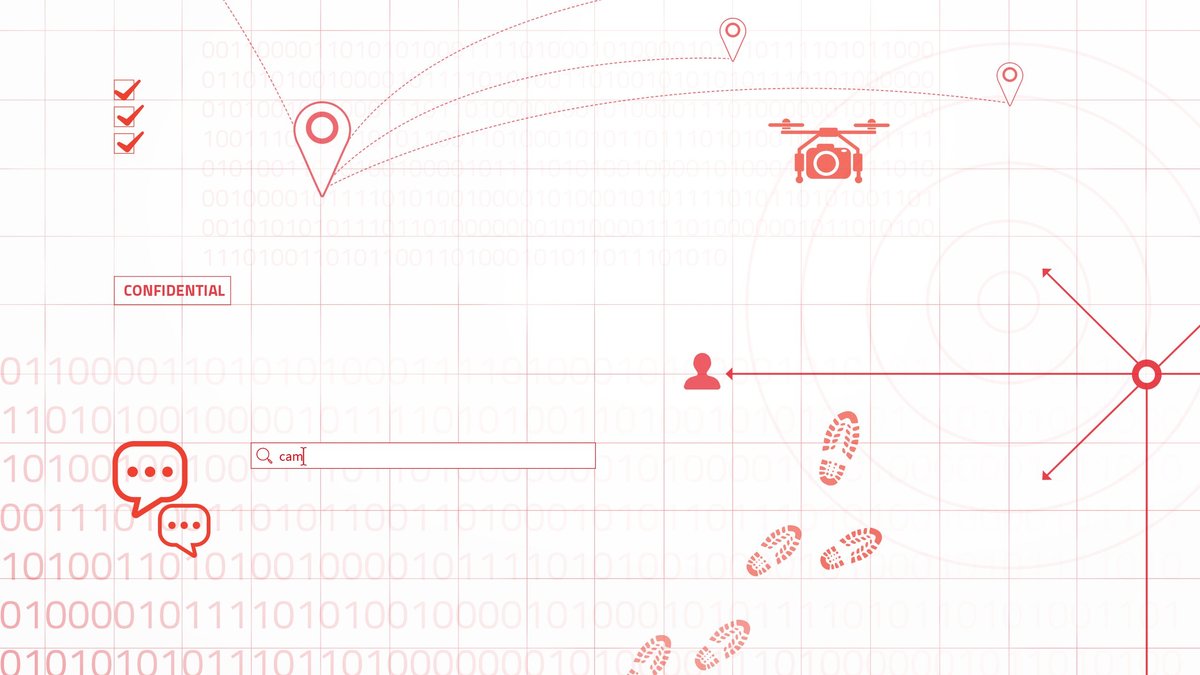Introduction
Vision
We want a better world – where corruption is challenged and accountability prevails, all can thrive within the planet’s boundaries, and governments act in the public interest.
Mission
Many of the world’s worst environmental and human rights abuses are driven by the exploitation of natural resources and corruption in the global, political and economic system. Global Witness is campaigning to end this. We carry out hard-hitting investigations, expose the facts, and push for change. We are independent, not-for-profit, and work with partners around the world in our fight for justice.
Values
Courage and tenacity for justice.
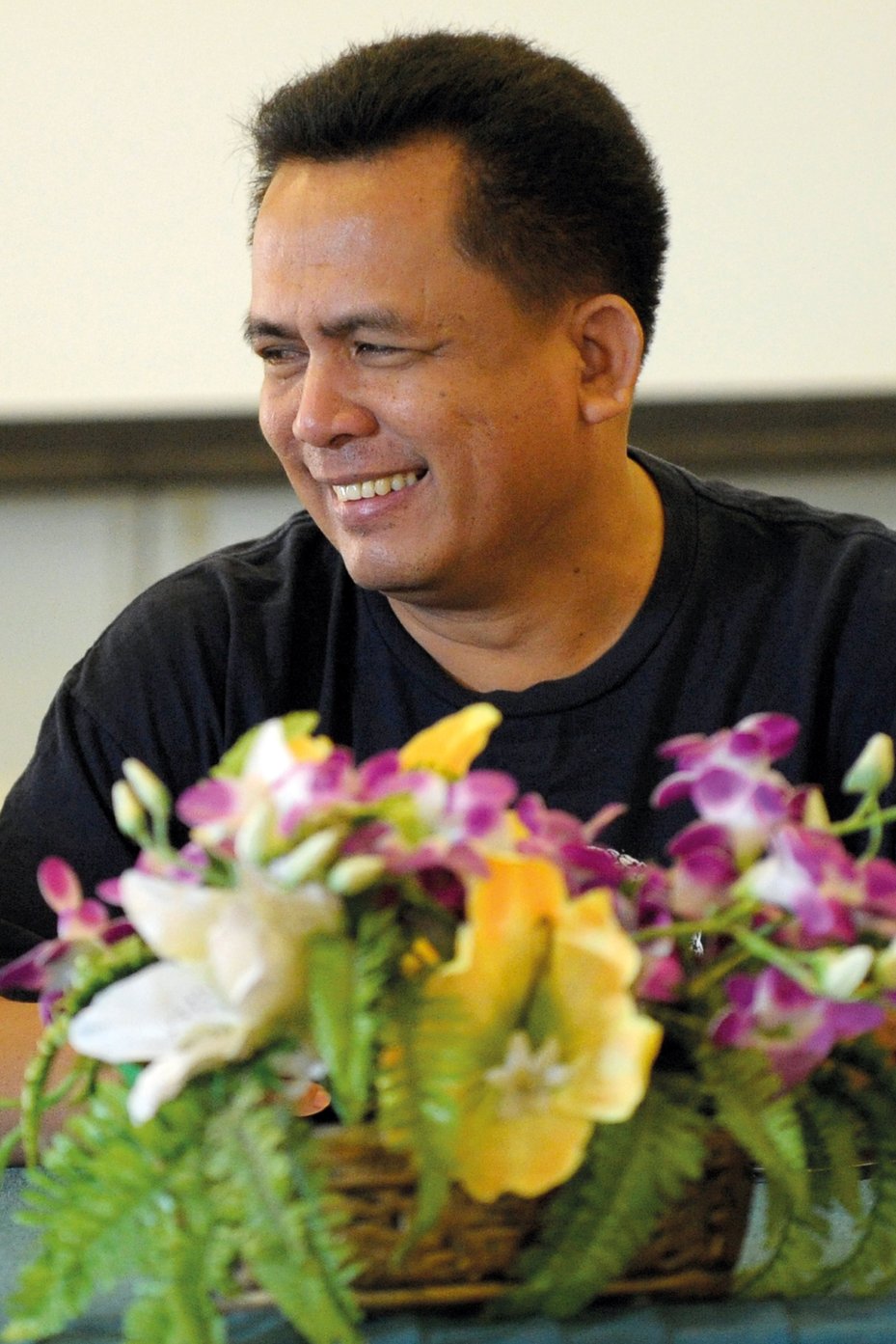
Kem Ley, Cambodian doctor and activist, 9 October 1970–10 July 2016. Tang Chhin Sothy/ Stringer / Getty
Dedication
Kem Ley, Cambodian doctor and activist, 9 October 1970–10 July 2016
Kem Ley was one of Cambodia’s most prominent political commentators and human rights activists. He was killed in July last year, just days after Global Witness’s report Hostile Takeover was published.
Ley had not been involved in our investigation but he had come out publicly in support of its findings, and his death is widely viewed as a political assassination. It serves as a poignant reminder of the fragility of many of the freedoms Global Witness campaigns for.
This report is dedicated to his memory and those he leaves behind.
2016 in numbers
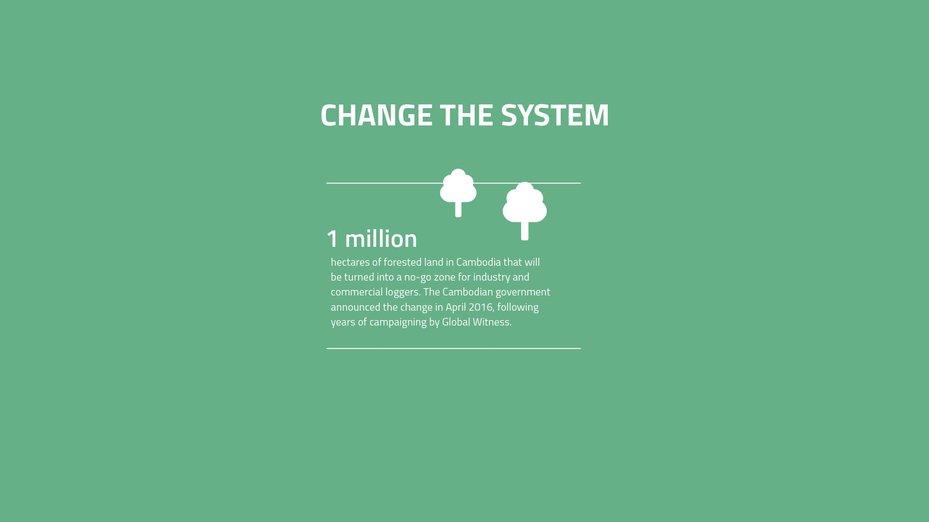
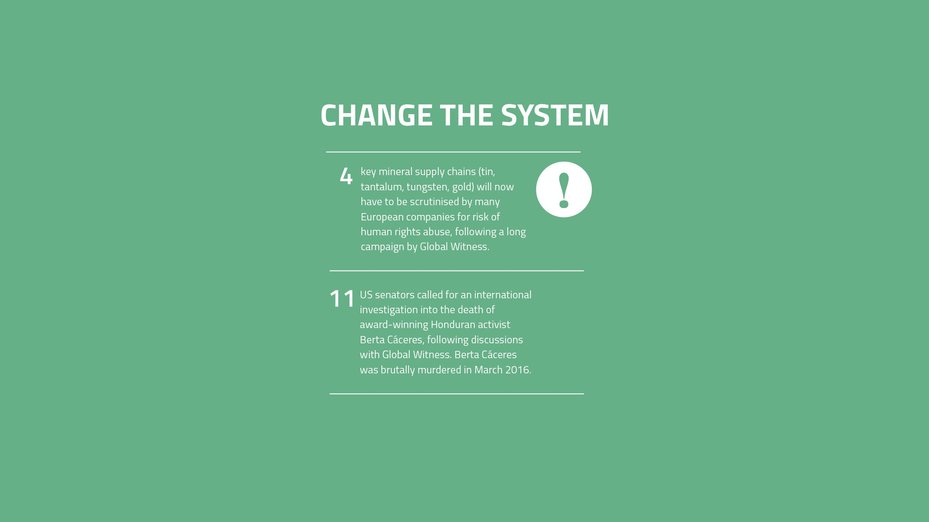
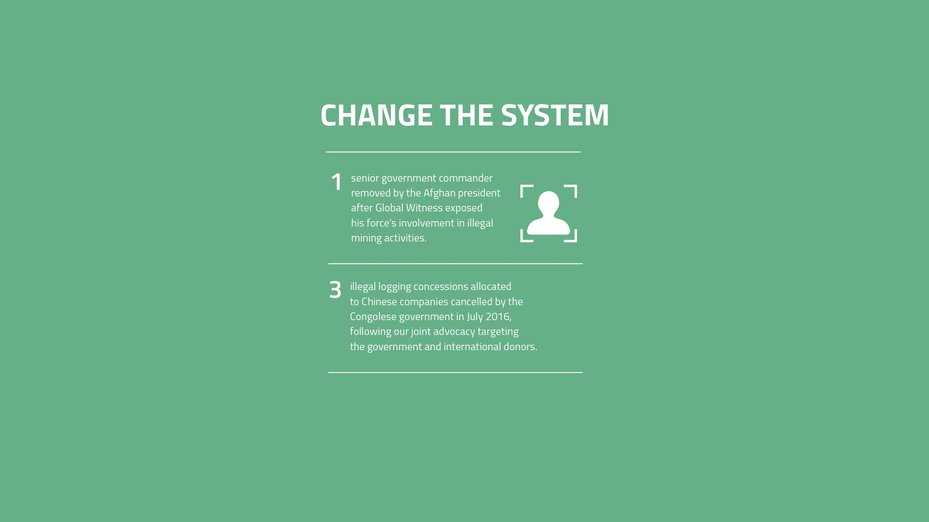
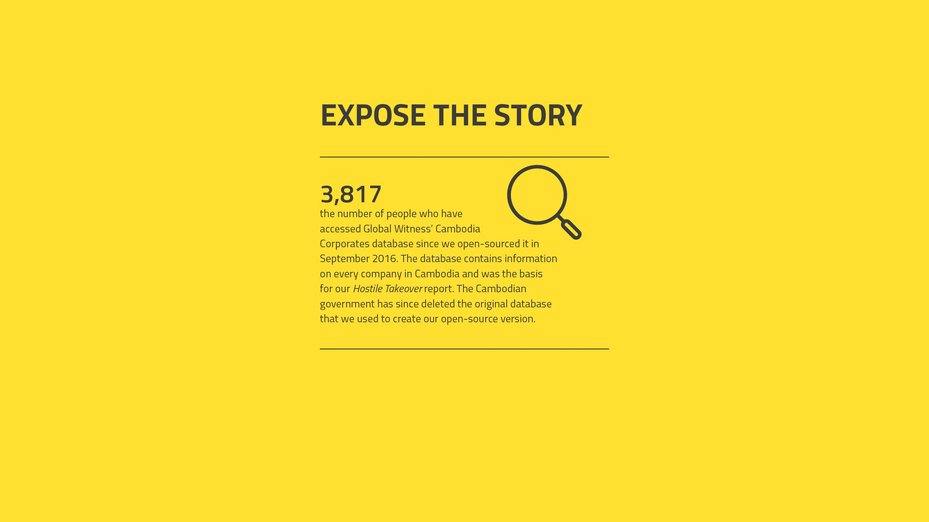
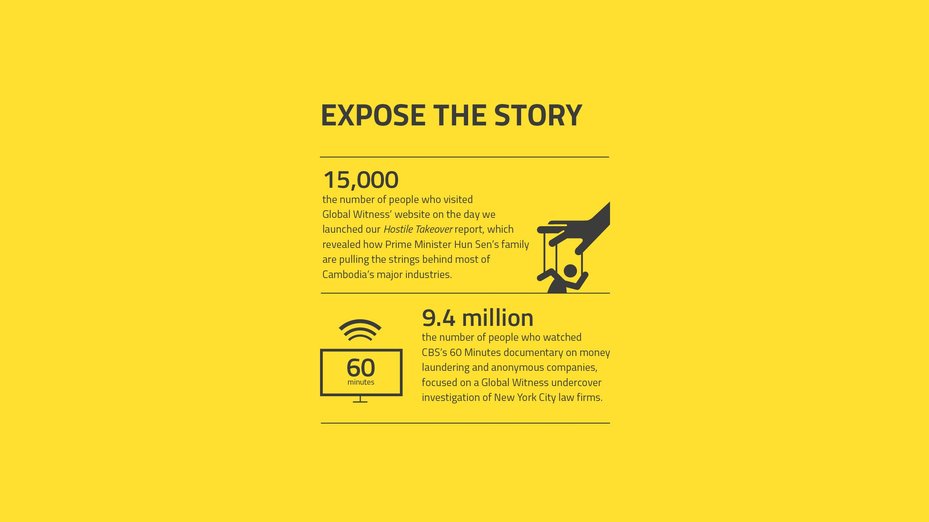
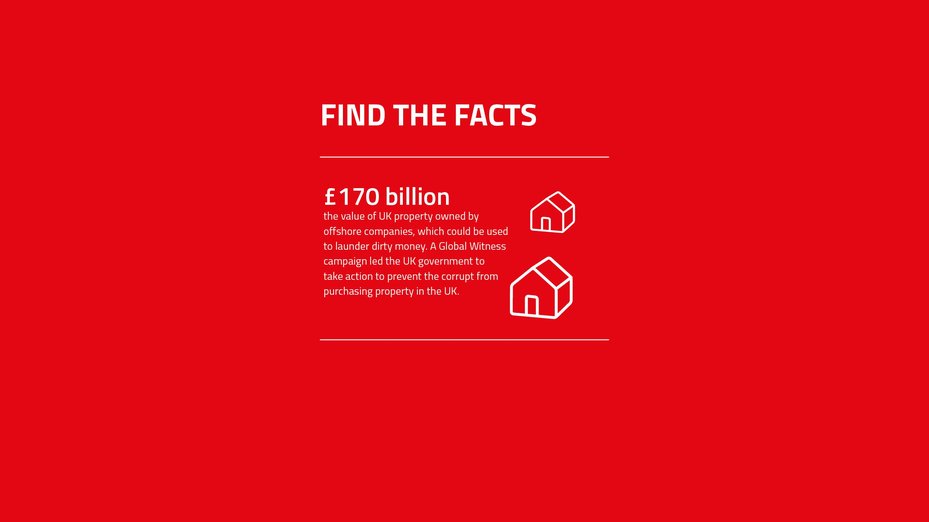
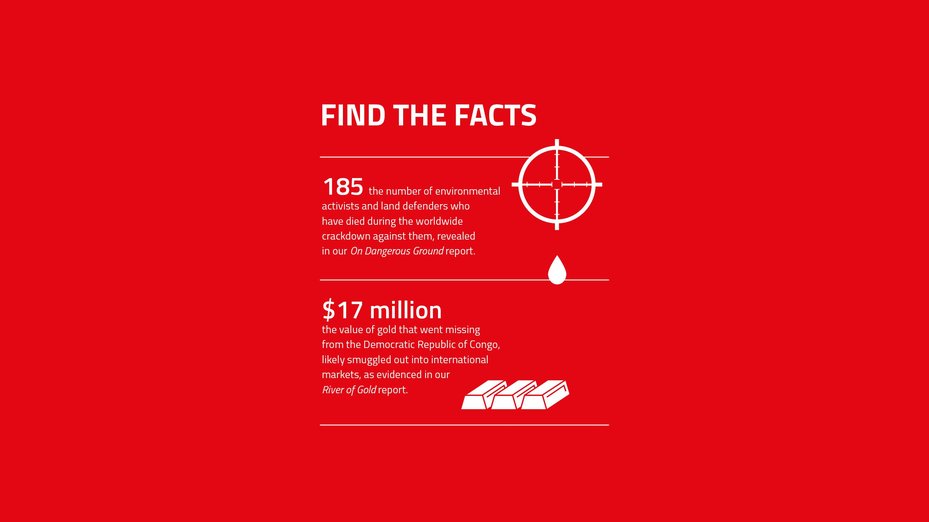
2016 annual report: Exposing the truth
Foreword
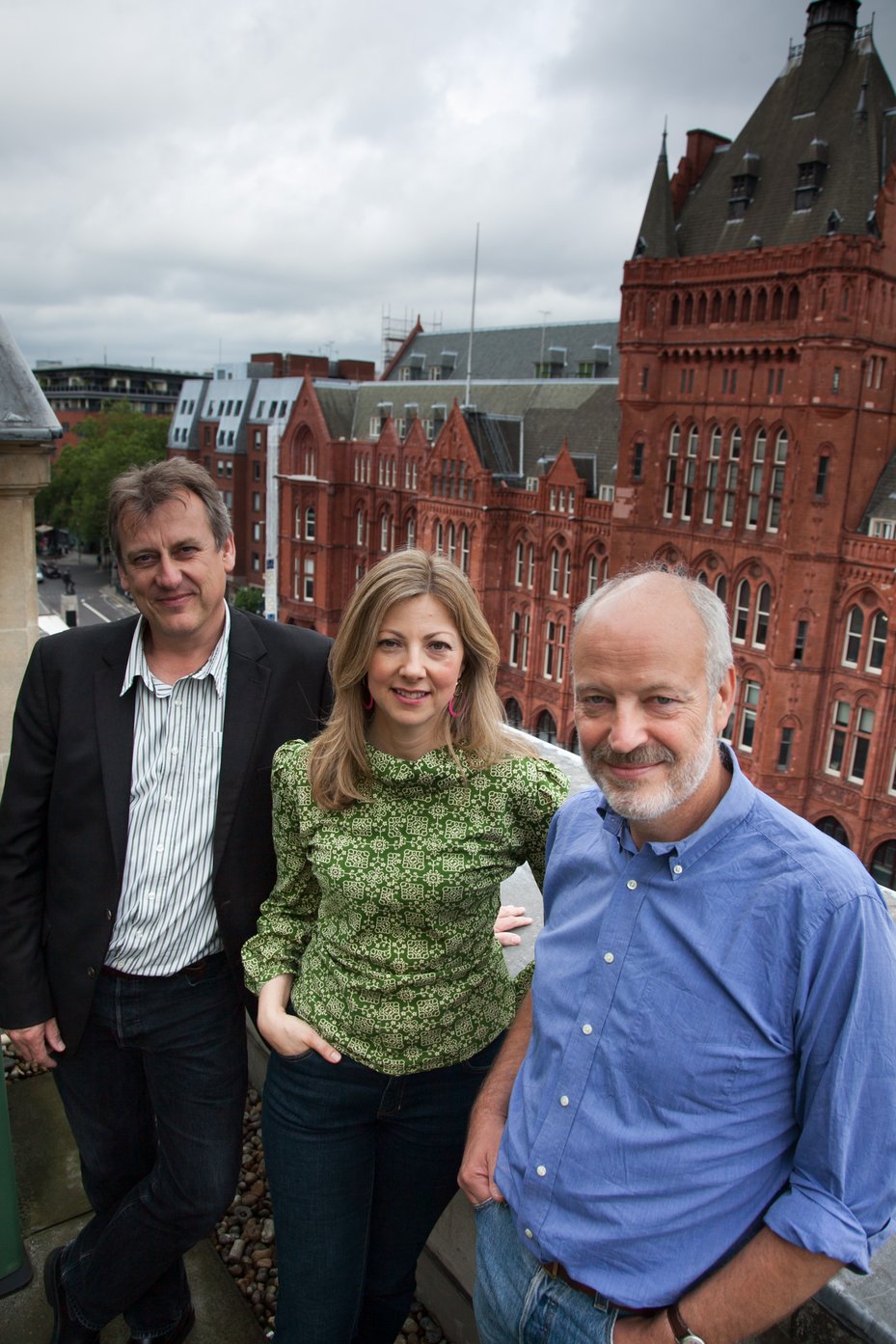
Global Witness founders: Simon Taylor, Charmian Gooch and Patrick Alley.Kristian Buus
Founder's foreword
Global Witness has always been bold and innovative in the way we work. This year’s annual report showcases some of the techniques our campaigners have used to find the facts, expose the story and change the system.
From flying drones over virgin rainforest in Papua New Guinea to going undercover in New York City to reveal the role lawyers can play in discussing how potential clients could move suspect money, we’re driven by the desire to get to the truth, and provide incontrovertible evidence that drives change.
The bravery and tenacity of our campaigners makes us proud, and is part of the core spirit of Global Witness. Not everything they do is exciting or risky: many of our stories are the result of painstaking analysis of data to connect politicians and other elites to the corrupt looting of state assets.
However, the dangers faced by our fellow activists can be extreme. The well-known Cambodian government critic and activist, Kem Ley, was gunned down days after speaking about our Hostile Takeover report on Cambodian radio. Such events are a brutal and tragic reminder of how high the stakes are when confronting corruption.
2016 showed that no part of the world – no matter how fragile or protected – is immune from exploitation. Patronage, corruption and undue political influence have resulted in the corporate capture of democratic space and we will need to fight hard to counter the trend towards fraudulent populism. But we don’t feel defeated or discouraged. On the contrary, we’re at our best when we’re up against it.
2016 was also the first full year of our new structure with Gillian Caldwell as CEO and an expanded Board. This is working really well and has allowed us as Founders to step back from managing day to day operations in order to focus on how we can help Global Witness tackle some of the most difficult situations for people and planet in generations. As always, we continue to be deeply involved in the organisation’s campaigns and fundraising.
Looking ahead, climate change will be an increasingly important focus of Global Witness’ investigations, and we hope to reveal our first explosive findings in 2018. Watch this space.
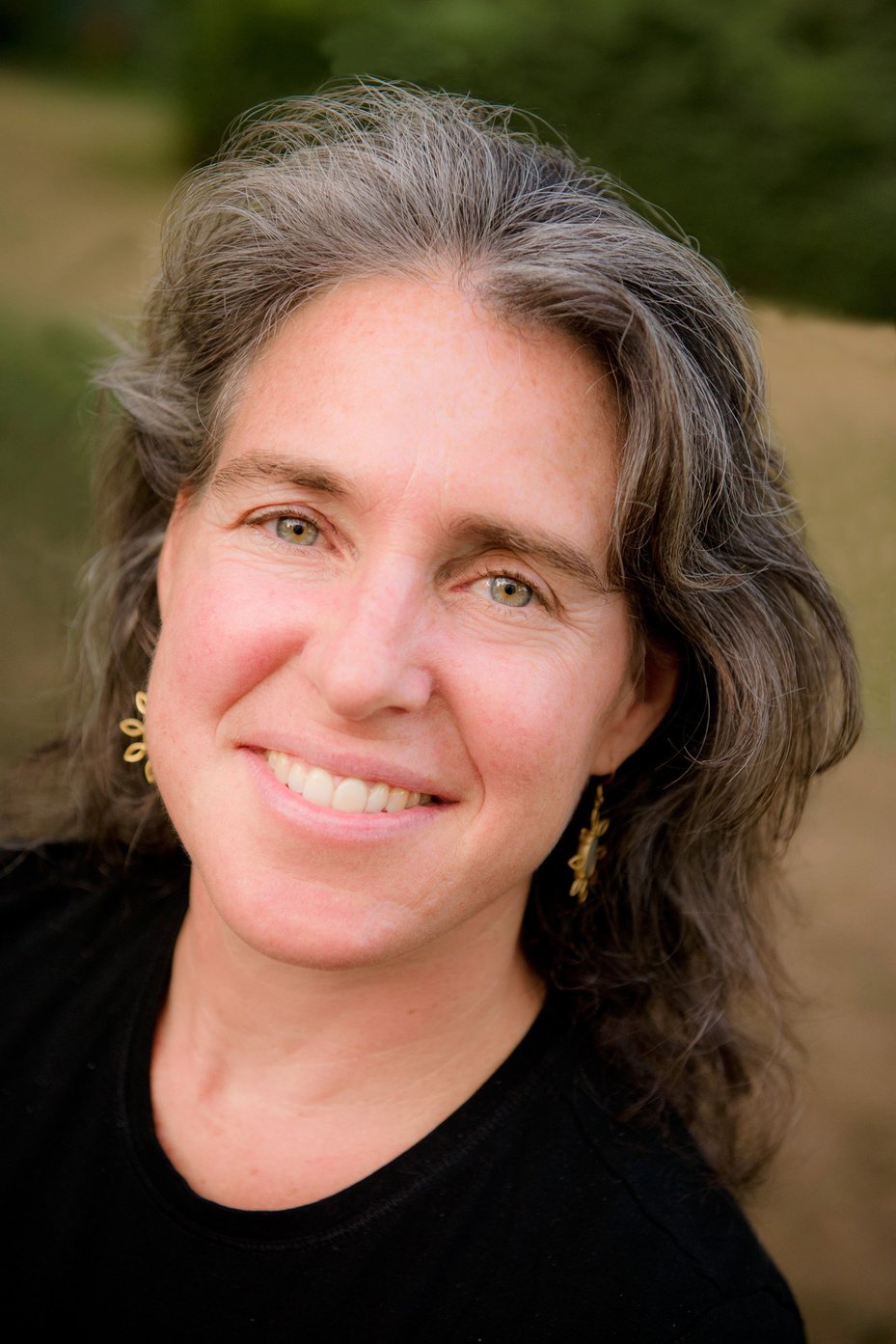
Gillian Caldwell, CEO, Global Witness
CEO's foreword
2016 was quite a year with a range of exciting wins as well as some significant setbacks in the global context. Our work on the corrupt sale of a hugely valuable Nigerian oil exploration licence to Shell and Eni was classic Global Witness: high energy, high stakes, dogged pursuit of facts, and great collaboration with partners. This led to the freezing of funds and the launch and continuation of formal investigations and legal proceedings in Italy and the Netherlands.
Following our high profile exposés of how the London property market was being used to launder dirty money, then UK Prime Minister David Cameron announced that anonymous companies would have to reveal the names of their ultimate owners. There are now 16 countries moving towards having public registers of beneficial ownership thanks to our flagship campaign and our determined work with allies.
Since 2013, Global Witness has campaigned for the EU to act to prevent the trade in minerals from fuelling or funding conflict. Finally in 2016 we secured landmark legislation that will require companies importing raw minerals into Europe to ensure they are not directly or indirectly financing conflict or human right abuses.
In July 2016, the new Myanmar government announced that no jade licences would be extended, and no new licences would be awarded, until a revised legal framework is in place. They also committed to an environmental assessment of the jade mines. This followed a groundbreaking report and concerted advocacy by Global Witness to prevent the $31 billion jade industry from benefiting few except a small handful of crooks and cronies.
In September 2016, New York hedge fund Och-Ziff, was ordered to pay $413m by the US Securities and Exchange Commission for violations of the Foreign Corrupt Practices Act (FCPA). This is one of the biggest fines ever handed out for violating the FCPA, and follows many years of advocacy by Global Witness on secretive mining deals in DRC.
Even as we celebrate our many successes in changing laws and ensuring accountability for wrongdoing, we are concerned about a range of worrying global dynamics. The UK’s decision to leave the EU in the Brexit vote risks profoundly weakening UK efforts core to our mission at Global Witness: to protect human rights and tackle corruption, environmental destruction and climate change.
So much of the progress we have made over the past 15 years has relied on the power of collective action within the European Union. Our ability to stop developing countries being robbed of their natural resources and to create a just, sustainable world depends on international and regional collaboration.
The Brexit vote is also part and parcel of a deeply worrying global trend, as reflected in President Trump’s election and around the world, towards a more xenophobic, inward-looking, and fear-based mentality. Now more than ever, the many people who care passionately about the planet and the people that live on it must stand together and demand positive change.
We thank you for your support and rededicate ourselves to our vision of a world where corruption is challenged and accountability prevails, all can thrive within the planet’s boundaries, and governments act in ways that benefit the many rather than a select few.
Where we work
Protecting resources and fighting corruption around the world
Global Witness exposes natural resource exploitation, environmental destruction and human rights abuses around the world. We campaign to change weak regulation and corrupt systems that allow this to take place.
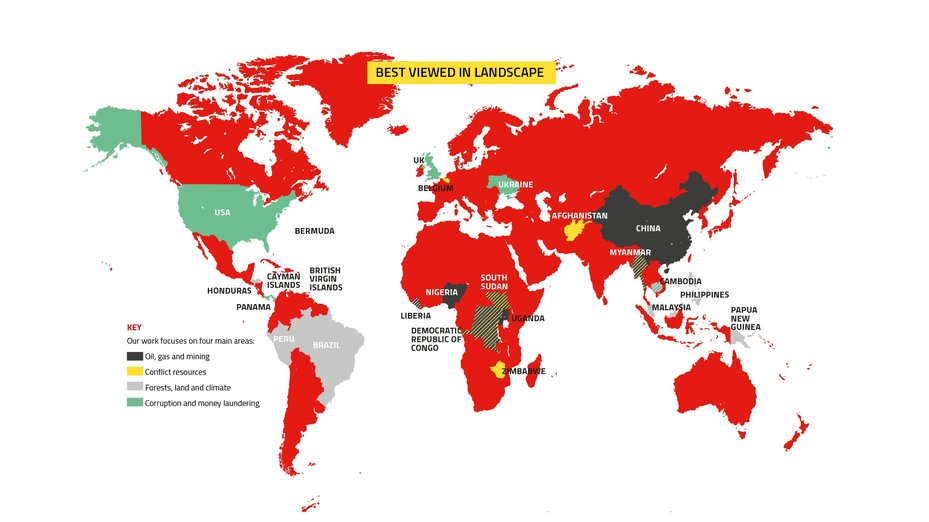
USA
The US has been a leader in anti-corruption legislation, although these efforts now look threatened under President Trump.
Honduras
Global Witness research shows that Honduras is the most dangerous country in the world to be an environmental activist. Over 120 Hondurans have been killed since 2010 after standing up to predatory companies and corrupt politicians.
Tax havens (e.g. Panama, British Virgin Islands, Cayman Islands and Bermuda)
The ‘Panama Papers’ gave a glimpse of how politicians and criminals use anonymous companies and tax havens to hide their cash. Of the companies named in the files, nearly half were incorporated in the British Virgin Islands, a UK overseas territory.
Global Witness used the leak to highlight the role of the UK’s overseas territories in selling secrecy and campaigned for them to create public registers of the real owners of companies.
Nigeria
Global Witness has been at the forefront of exposing one of the biggest corruption scandals in recent history – a US$1.1bn deal for one of Nigeria’s largest oil blocks – OPL 245. As a result, major oil companies Eni and Shell are under investigation by the Milan Public Prosecutors office.
Democratic Republic of Congo
At least half of eastern Congo’s artisanal miners work in mines where armed groups are present. Global Witness campaigns to prevent minerals being used to fund conflict.
Belgium (Brussels)
In 2016, as a result of three years of campaigning by Global Witness, the EU passed landmark legislation that will require companies importing raw minerals into Europe to ensure they are not financing conflict or human right abuses.
UK
The UK published the world’s first fully open register of beneficial ownership in 2016, disclosing the real owners of all companies incorporated in the UK. The then Prime Minister David Cameron also promised to crack down on anonymous ownership of £170 billion worth of UK property, thanks to Global Witness’s campaigning.
China
Chinese companies are major players in the natural resource sectors globally. Global Witness is working with Chinese industry groups, government officials and researchers to develop understanding and implementation of best practice measures in the mining, timber and rubber industries around the world.
Cambodia
Cambodia has a history of predatory logging and opaque land deals. In 2016, after years of campaigning by Global Witness, the Cambodian government announced that it will turn one million hectares of forested land into a no-go zone for industry and commercial loggers.
How we work
The techniques we use to expose the truth
Global Witness uses a range of different investigative techniques and skills to help us expose the truth.
Our very first investigation into illegal logging involved counting logging trucks crossing the border from Cambodia into Thailand. Twenty years on, physical techniques like this are complemented by more high-tech tactics, such as the use of drones and satellite imagery analysis.
Whatever the technique, we are known for our meticulous attention to detail and our rigorous accumulation of evidence. For this reason, our reports can be months or even years in the making – but in the end frequently help us deliver system-changing results.
Document and research analysis
Detailed and painstaking analysis of financial records and other documentation, to find the facts that will help us build our case.
When investigating the corrupt deal for Nigerian oil block OPL 245, we analysed thousands of legal documents to establish Shell and Eni’s involvement. Our report led to Shell’s headquarters being raided by law enforcement officials in 2016 and money laundering charges being filed against Nigerian public officials.
Web scraping
Using computer programming to extract pertinent information from vast swathes of online data, and produce datasets that can be searched and interrogated to reveal stories.
See "Corruption and Money Laundering: Using Web Scraping to Inform Investigations", for an explanation of how we used this technique to create our Cambodia Corporates database in 2016.
Working with anonymous sources
Much of what we do starts with brave whistleblowers or undercover sources taking risks to share confidential information with us. We rely on these anonymous informants to tip us off on stories and build the evidence base for our policy-changing exposés. We are always vigilant in protecting their identities to keep them safe.
Both our Hostile Takeover report, which revealed how the Cambodian Prime Minister’s family has secret stakes in the country’s major industries, and our River of Gold report exposing the link between mining and conflict in the Democratic Republic of Congo, started with tip-offs from anonymous sources.
Collaborating with civil society
Partnering with local civil society organisations (CSOs) to gain invaluable access to local knowledge and networks, and then campaigning alongside them to drive change at the national and international level.
In our environmental defenders work, we collaborated closely with local partners in countries like Brazil, Colombia and Honduras to verify cases to include in our annual report On Dangerous Ground in 2016. In turn, local organisations in several countries have used data from On Dangerous Ground to push for further investigations and prosecutions.
Going undercover
Using hidden cameras and recording devices to expose corruption and money laundering, and to find out what’s truly going on behind closed doors.
See "Corruption and Money Laundering: Undercover Investigations" for an explanation of how we used this technique in 2016, going undercover in New York City law firms to expose how suspect funds from abroad could be laundered in the US using anonymous companies.
Modern technologies
Using drones, satellite imagery analysis, and GPS tracking devices attached to individual logs to get evidence of illegal and environmentally irresponsible activities. These technologies complement our on-the-ground research and can reveal information that we wouldn’t otherwise be able to get.
See "Forest, Land and Climate: Using drones and other technologies", for an explanation of how we used drones in 2016 to expose illegal logging in Papua New Guinea.
Physical presence
From our early days investigating the trade in illegal timber funding Cambodia’s genocidal Khmer Rouge, being a physical presence in the countries we research – for example, counting logging trucks going across borders and through checkpoints – has always been central to what Global Witness does.
This is still central to what we do. In 2016, investigators in Liberia visited religious sites destroyed by a rapidly expanding oil palm plantation and interviewed community members resulting in our October brief Temples and Guns.
Global Witness is the backbone of hope for […] fearless journalism, tough and independent journalism, journalism that in a world of increasing oligarchy will tell us the truth about money and power and the corruption that is robbing everyday people of their rights and resources.
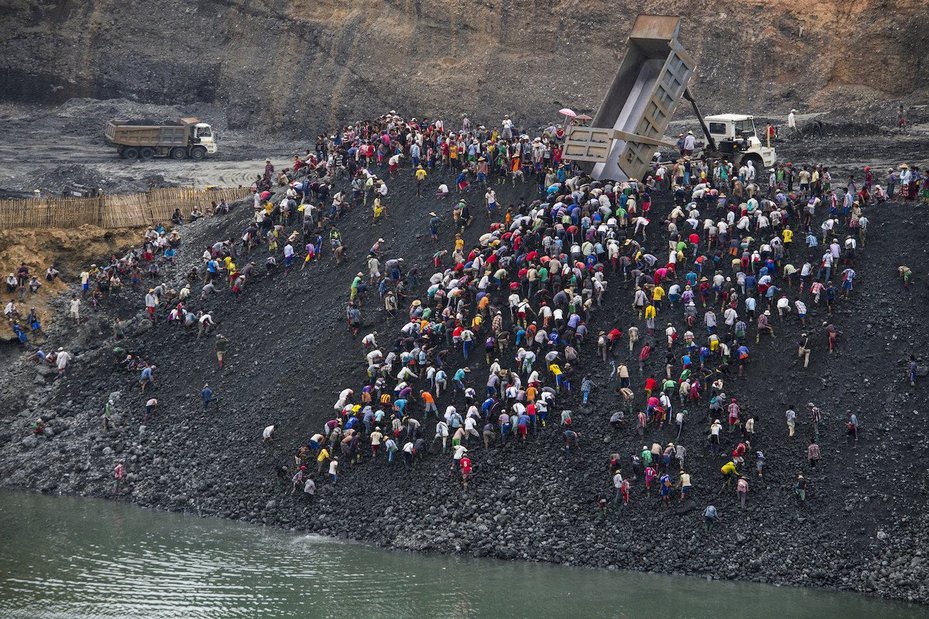
Small-scale miners search for stone as dump trucks from Myanmar Sein Lei Aung mining company dump waste in Hmaw Si Zar, Lone Khin, Hpakant, April 2015. Minzayar / Global Witness
Corruption and money laundering
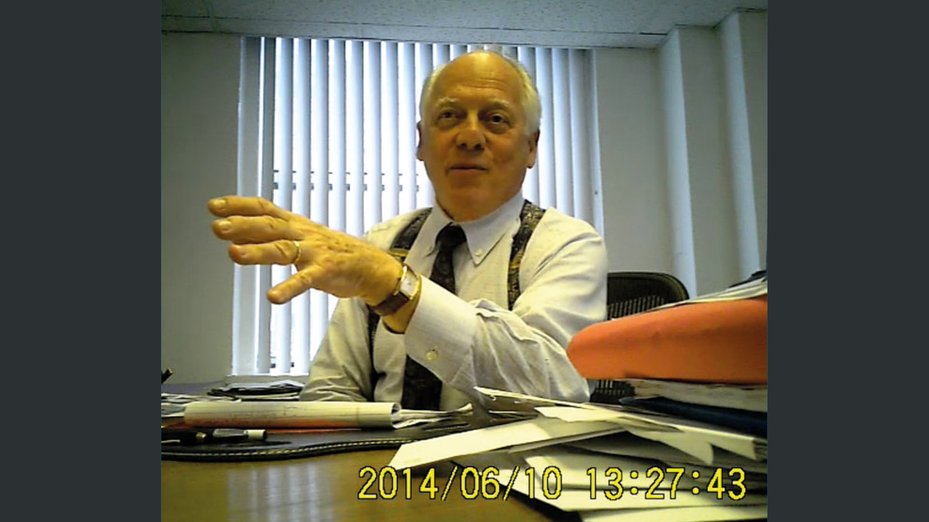
Bribe payments, anonymous companies, inadequate anti-money laundering checks, and global mobility are all opportunities that enable corrupt elites to launder money and enjoy luxury lifestyles overseas, completely under the radar.
Global Witness is campaigning to change the system that facilitates this greed and corruption on a global scale. We want to stop criminals, corrupt officials and crooked corporations from hiding their money and dodging taxes at the expense of ordinary citizens in developing countries and around the world.
Law firms featured on prime time TV
In January 2016, CBS 60 Minutes broadcast an undercover Global Witness investigation showing how suspect funds from abroad could be laundered in the US, using anonymous companies. Our daring work with hidden cameras exposed the role potentially played by US lawyers and law firms in facilitating the flow of dodgy money. (See How We Work.)
The show was broadcast to over 9.4 million viewers and was the ninth most watched programme in America that week. It was re-broadcast several months later and international press including The New York Times and The Guardian also picked up the story.
Following the broadcast, the New York Attorney General, Eric Schneiderman, said that the investigation “highlights the important issue of the use of anonymous corporate vehicles in the United States to hide and potentially launder foreign assets.”
Just days afterwards, a bipartisan group of US Representatives and Senators introduced new legislation to Congress. If it is passed, the Incorporation Transparency and Law Enforcement Act will require companies formed in the US to disclose their ultimate owners when the company is incorporated.
Our investigator was constantly in danger of being exposed. But the controversial footage he captured and the powerful story it told made it all worthwhile
How we work: Undercover investigations
Going undercover is a powerful way to investigate the secret world of money laundering and corruption. Sometimes it’s the only way to find out what’s truly going on behind closed doors. However, it’s a high-risk approach so we only use it when necessary.
In action: How Global Witness went undercover in New York
We wanted to show the loopholes in US law that allow potentially illegal flows of money to come into the country unchecked, and decided to target the legal sector that could facilitate this.
First, we checked that we wouldn’t be violating any US laws by filming in secret. We also made absolutely sure that no money would change hands: this could mean we were entering a contract, and have serious legal repercussions.
Next, we devised a credible story. Our investigator would pose as an advisor to a West African mining minister looking to bring money into the US.
We set up meetings at 13 different New York City law firms. In the meetings, our investigator, who carried a hidden camera, drew on his overseas experience and understanding of how deals are done to convince the lawyers that he was legitimate.
In these meetings, the “advisor” stressed the need to keep his “client’s” identity a secret.
Lawyers from 12 of the 13 firms suggested he could use a network of anonymous companies to bring money into the country and intimated they might be able to help to do so. All but one of the firms recommended using American companies.
The outcome
Such a high-risk investigation meant that there were challenges every step of the way. Our investigator was constantly in danger of being exposed. But the controversial footage he captured and the powerful story it told, broadcast on national TV, made it all worthwhile.
The exposé resulted in legislation being introduced in Congress to close the loopholes in the law that enable the use of this sort of mechanism.
When we awarded Global Witness the 2014 TED Prize, they had an idea that was ahead of its time. Anonymous companies wasn’t on people’s radars. Heading into 2017, the hardest fight is ahead - to make sure that strides in the right direction aren’t reversed and make sure people continue to understand the ways corruption drains resources from everyday people.

Volunteer data scientists exploring the new UK beneficial ownership data at our Data Dive event in November 2016.Briony Campbell
Holding UK banks to account for preventing corruption
An historic new initiative to prevent corrupt money flowing through UK banks came into effect in March 2016, following years of campaigning by Global Witness and our allies.
The new Financial Conduct Authority (FCA) rules mean that UK banks will have to name a senior manager as personally responsible for ensuring that the bank does not handle the proceeds of crime, including corruption.
This is something Global Witness has long campaigned for. Allies in Parliament have confirmed that without pressure from us, the responsibility for Anti-Money Laundering (AML) compliance would not have been included in the final rules.
Cracking down on anonymous companies
In April, the International Consortium of Investigative Journalists’ (ICIJ) leak of over 11 million documents – the Panama Papers – from Panamanian law firm Mossack Fonseca dramatically demonstrated how offshore tax havens can be used to facilitate corruption, criminality and tax evasion.
We responded rapidly to the leaks, drawing on our investigation and campaigning experience to explain the systemic problems that allow this to happen.
A month later, we used the platform of the UK’s Anti-Corruption Summit to continue our high profile campaign against anonymous companies using the UK property market to launder dirty money.
At the Summit, the UK government announced new legislation that will require any foreign company that currently owns property in the UK or that purchases property in the future to declare its beneficial owner.
The legislation was informed by our recommendations, and with over £170 billion of UK property currently owned by foreign companies, represents a huge win.
In July, the UK published the world’s first fully open register of beneficial ownership, disclosing the real owners of all companies incorporated in the UK.
These kinds of public registries are something Global Witness has been advocating for years. Now law enforcement, businesses, NGOs and citizens will be able to find out who they’re really dealing with.
Over the second half of the year Global Witness worked with DataKind and OpenCorporates to investigate the new data and expose teething problems, such as the use of free-text fields for nationality and date of birth, which created some anomalies in the data.
We also took our campaign to the US, highlighting in a report and follow up briefings how anonymous companies pose a major risk to investors who might unwittingly back illegal or corrupt activities.
We coordinated a letter to US Congress from a group of investors, who between them manage over $740 billion in assets, calling for greater transparency around beneficial ownership.
Thanks to our campaigning over the last eight years, 16 countries are now moving towards having public registers of the ultimate, beneficial, owners of companies.
In 2017, we’ll be pressing the EU to establish public registries for company ownership, while working to ensure the UK registry is robust and sets a global standard. We’ll also continue to build the case for ending anonymous companies in the US.
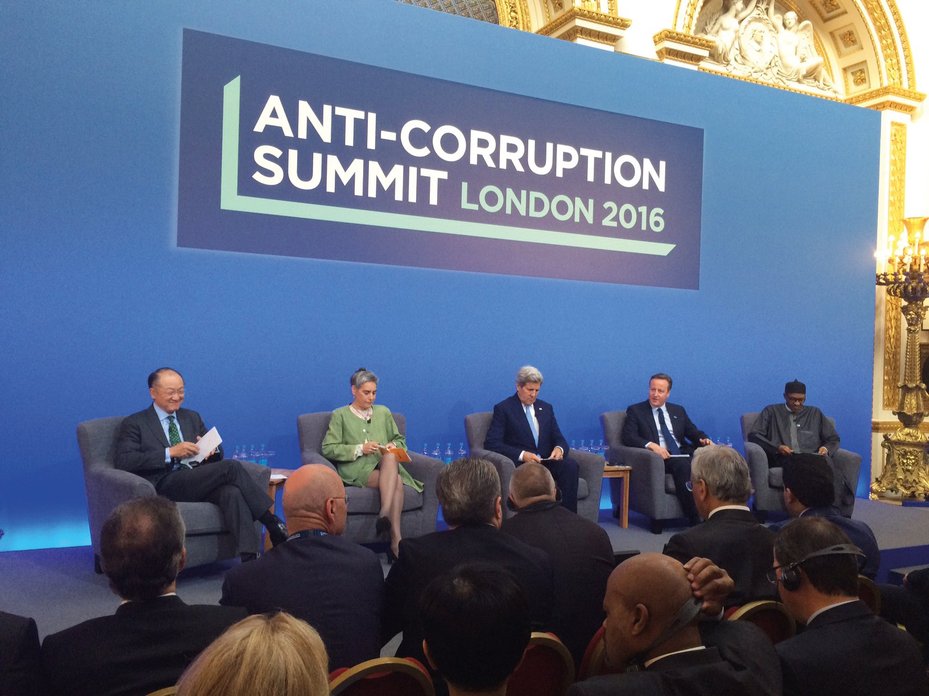
On 12 May 2016, on the back of Global Witness’ and our allies campaigning, the UK hosted a landmark Anti-Corruption Summit, which among other things, proposed solutions to the pervasive problem of criminals using anonymous companies to launder dirty money.Global Witness
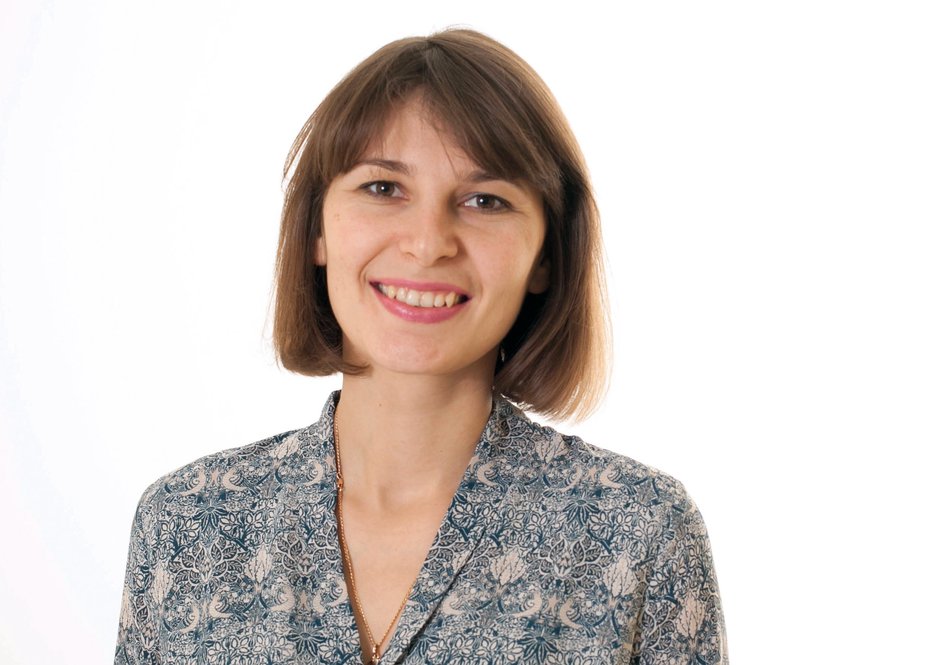
Daria Kaleniuk, Ukrainian activist.AntAC
Activist Profile: Daria Kaleniuk, Ukrainian activist
Daria Kaleniuk is the co-founder and executive director of the Anti-corruption Action Centre in Ukraine. Kaleniuk first became involved in activism as a student.
She received a Fulbright scholarship to study in the US, where she researched international legislative tools to fight corruption, and then returned to Ukraine to implement those tools in her own country.
In 2012, together with Vitaliy Shanunin, a long time associate and civic activist, Kaleniuk set up the Anti-Corruption Action Centre. The organisation advocates for anti-corruption legislation, and puts pressure on authorities to implement it. Their goal is to ensure personal liability for embezzlement of state funds and natural resources.
“We analyse all publications about corruption in Ukraine reported by investigative journalists, assess whether there are enough legal grounds to trigger reaction of law enforcement and controlling agencies and then submit legal requests to these agencies both in Ukraine and abroad,” she explains.
“We still face many challenges: our current political leadership is trying to roll back and attack new anti-corruption institutions and tools. Yet we have made great strides forwards too. One of the agencies we helped create – the National Anti-Corruption Bureau of Ukraine – has already started to trigger criminal investigations against very senior politicians.”
Working together with Global Witness, the centre exposed the offshore ownership structure of the luxurious palace of the ousted president Yanukovych, who fled Ukraine in February 2014.
This case caught the attention of the global media, helping to show how grand corruption in captured states is being enabled by assistance from the West.
Kaleniuk dreams of a day when she can close her organisation, in a Ukraine that is free from corruption.
She wants a Ukraine “where engagement in corruption should not be a prerequisite for success; where state funds are spent on medicine and education instead of being laundered; and where natural resources give decent jobs to people, instead of enabling huge profits for oligarchs.”
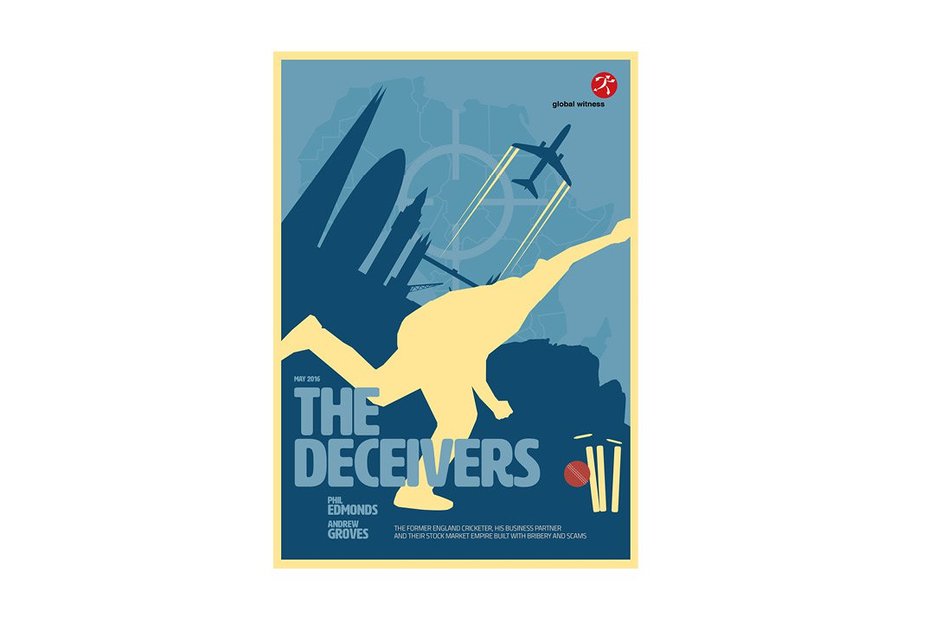
The Deceivers uncovered
In May, Global Witness published an explosive report exposing scams against investors on London’s junior stock exchange and high-level bribery in West Africa.
The Deceivers revealed how, with the help of secrecy laws in tax havens and using the services of a top London lawyer, former England cricketer Phil Edmonds and his business partner Andrew Groves crafted intricate insider deals to skim off millions of dollars of investors’ funds.
Groves and Edmonds floated a string of companies on London’s Alternative Investment Market (AIM), a magnet for fraudulent and corrupt companies due to its lax system of self-regulation.
As a result of our investigations, Edmonds and Groves’ company Sable Mining was forced to delist from AIM. It also led to indictments in Liberia of the former Speaker of the House of Representatives, the former Mining Minister and the lawyer who helped Sable bribe officials. The trial is now under way in Liberia and is anticipated to conclude in autumn 2017.
Despite mounting evidence, so far the AIM has refused to acknowledge any problems. In 2017 Global Witness will seek to end that complacency and press the government to launch an independent enquiry.
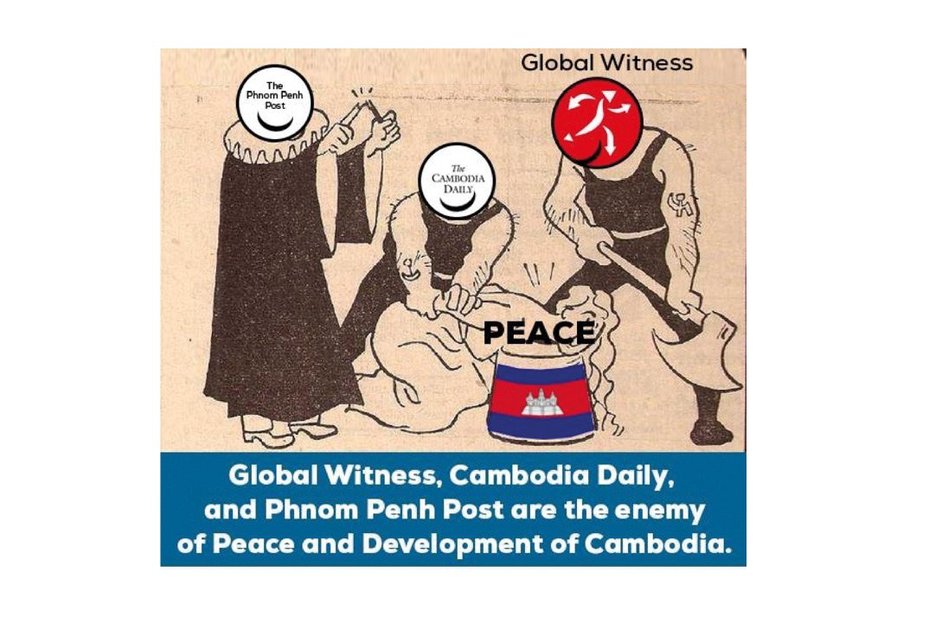
The pro-Cambodian government website Fresh News published a doctored version of Nazi propaganda in which war-time leaders were replaced with logos of Global Witness and newspapers the Phnom Penh Post and Cambodia Daily, with the Star of David substituted.Fresh News
A hostile takeover by Cambodia's elites
Global Witness has been conducting investigations in Cambodia for over 20 years, exposing the corruption at the heart of the country’s timber trade and shining a light on land grabbing and natural resource exploitation.
On 7 July 2016, we launched an explosive report, Hostile Takeover, which revealed how Prime Minister Hun Sen’s family is pulling the strings behind most of Cambodia’s major industries. We showed how members of the family own or part-control companies worth more than US$200 million, including some with links to international brands such as Apple, Nokia, Durex and Nestle.
Hostile Takeover’s findings attracted worldwide media coverage. The story was picked up by The New York Times and The Financial Times, who recognised it as a wakeup call for investors and foreign companies doing business in Cambodia. It also made the front page of the Phnom Penh Post, whose website crashed after an unprecedented number of people attempted to read the story.
Hun Sen and his children responded directly to the report on Facebook, falsely accusing Global Witness of politically motivated lies.
Tragically, three days after the report launched on 10 July, political commentator Dr Kem Ley was murdered. He had given long interviews about Hostile Takeover to both Radio Free Asia and Voice of America. We may never know for sure why he was killed, but his murder is widely condemned as a political assassination and is frequently linked to his positive comments about Global Witness’ report.
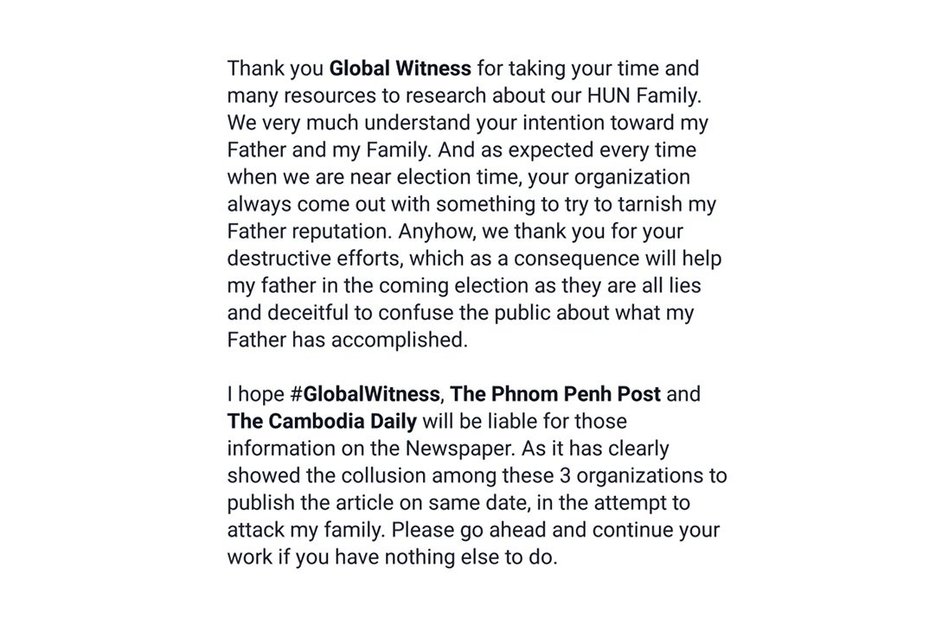
After the release of Hostile Takeover, Hun Sen’s daughter Hun Mana posted this response on her Facebook page.Hun Mana / Facebook
Analysing the data, a clear and damning picture emerged of a sprawling web of conflicts of interest at the highest levels of Cambodian business and society. We could see which powerful people in the Hun Sen family were connected to which big companies
How we work: Using "web scraping" to inform investigations
Global Witness’ investigations rely on hard evidence and data. Sometimes this requires us to analyse vast quantities of online information. To do this we often use a technique known as “web scraping”.
In essence, this means using computer programming to extract information from websites and turn it into datasets that can be searched and interrogated. This technique is becoming increasingly important in our investigations.
In action: How web scraping uncovered the Hun Sen family’s corporate interests
Our Hostile Takeover investigation began over lunch with a Cambodian source, who revealed a spreadsheet of 30,000 records from the Cambodian Ministry of Commerce. We quickly realised the potential of this data to prove links between powerful individuals and big business in Cambodia.
The information was already available on a government website, but not in a form that we could use. It was difficult to search and required a login, making it risky for activists to access the site.
We decided to extract the contents and create our own secure website, which would not require a login. With some clever coding, we also developed a powerful search function.
Analysing the data, a clear and damning picture emerged of a sprawling web of conflicts of interest at the highest levels of Cambodian business and society. We could see which powerful people in the Hun Sen family were connected to which big companies, and how these companies were operating with impunity.
When our investigation was complete, we decided to open source both the dataset and the research tool we had developed, including the underlying source code.
The outcome
The report prompted reactions at the highest political levels in Cambodia. The availability of the raw data has boosted corporate transparency by giving investors a new way to do due diligence on Cambodian companies.
Thanks to the database we created, anyone – NGOs, journalists, civil society – can freely access, remix and build on our work. Nearly 4,000 individuals have visited the site since it launched.
Shortly after our investigation, the government deleted the original dataset, making our open source version an invaluable public archive.
Conflict minerals
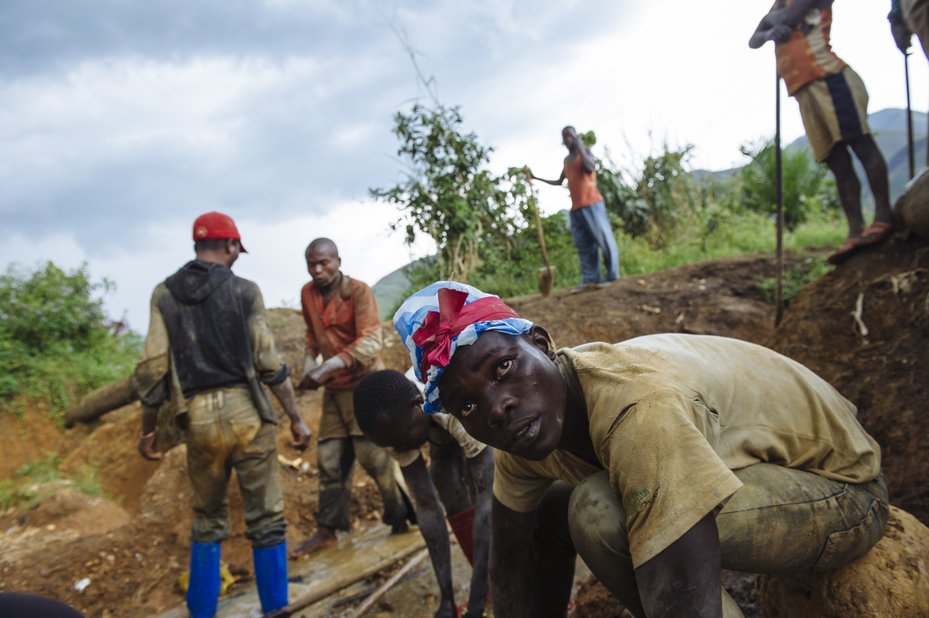
An artisanal miner pans for gold at the Mufa II gold mining site in South Kivu in the east of the Democratic Republic of the Congo.Phil Moore
Minerals and metals like gold, tin, and jade are used in hundreds of products central to modern life, from jet engines to mobile phones. The raw resources are often mined in developing countries, where they should create jobs and reduce inequality, but frequently the mine workers and local communities see no benefit.
Instead, armed groups and corrupt government officials vie for control of the lucrative trade, which both incentivises and funds continued conflict. Unscrupulous businesses willing to turn a blind eye to violence reap huge profits, while populations suffer and development stagnates.
For over two decades, Global Witness has been at the forefront of efforts to persuade governments and businesses to make mineral supply chains fair and transparent.
Landmark EU law on conflict minerals
Since 2013, Global Witness has campaigned for the EU to act to prevent the trade in minerals from fuelling or funding conflict. As a result, in 2016 landmark legislation was passed that will, for the first time, require companies importing raw minerals into Europe to ensure they are not directly or indirectly financing conflict or human right abuses.
Global Witness led a coalition of civil society organisations whose input, scrutiny and public campaigning significantly strengthened the final law. However, a number of corporations and their political allies are now attempting to push back. In 2017, we’ll be defending the progress we made, while continuing to expose the cost of conflicts bankrolled by the illegal trade in minerals.
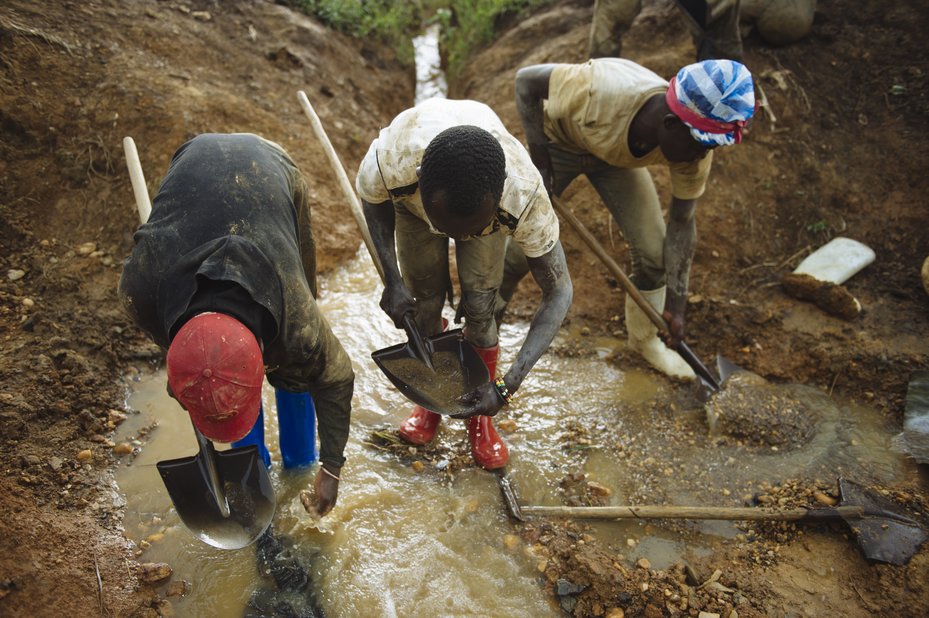
Artisanal miners pan for gold at the Mufa II gold mining site in South Kivu, in the east of the Democratic Republic of the Congo.Phil Moore
Congo's River of Gold
Global Witness has worked for over a decade to expose the conflict mineral trade in the eastern Democratic Republic of Congo (DRC), where workers often risk their lives digging by hand in dangerous makeshift mines.
In July 2016, we published an investigation into a gold boom in South Kivu, revealing how armed groups received cash and weapons from a private Chinese mining company and made up to $25,000 per month extorting local miners. In just one year, up to $17 million worth of gold from one territory went missing, likely smuggled out of Congo onto international markets.
Following the report launch, Congo’s Minister of Mines called for a “thorough clean up” of the gold sector and dispatched an official investigation team to verify the report’s findings. This led to the detention in Kinshasa of four individuals Global Witness had written about in our report.
At the end of November 2016, the three Congolese officials who had been detained were released and await possible disciplinary action. A French citizen, Franck Menard, returned to France without charge.
In 2017 we will continue to work with local and international civil society partners and others to ensure those involved are held accountable.
Facilitators of corruption in Congo’s mining sector
Our work exposing the involvement of international actors in corruption in the DRC continued to make waves in 2016. We published a report detailing how Britain’s Overseas Territories helped facilitate six secretive mining and oil deals that lost Congo $1.5 billion.
Following these revelations, the UK’s Serious Fraud Office was given blockbuster funding to further investigate the deals (which Global Witness first wrote about in 2012), with a specific focus on the involvement of Israeli businessman Dan Gertler.
The US government also fined hedge fund Och Ziff $413m, partly in relation to its role in financing deals with Gertler. Documents published alongside the fine confirmed much of what we suspected about top DRC state officials receiving multi-million dollar payments from mining deals in the DRC.
We also broke a story in 2016 showing how the London-listed mining giant Glencore had secretly agreed with the state mining company to send mine royalty payments, which that company was due to receive, to Gertler instead.
The stakes are high in Congo. Elections were controversially postponed amidst widespread protest in 2016. The deal to hold them this year is falling apart. There is a clear risk that corruption in the mining sector could distort the democratic process, prevent a peaceful transition of power, and lead to further violence and bloodshed.
Global Witness stands out for its bold, thorough investigations. It goes places others wouldn’t, and the sort of journalism and advocacy it does is more important now than ever before.
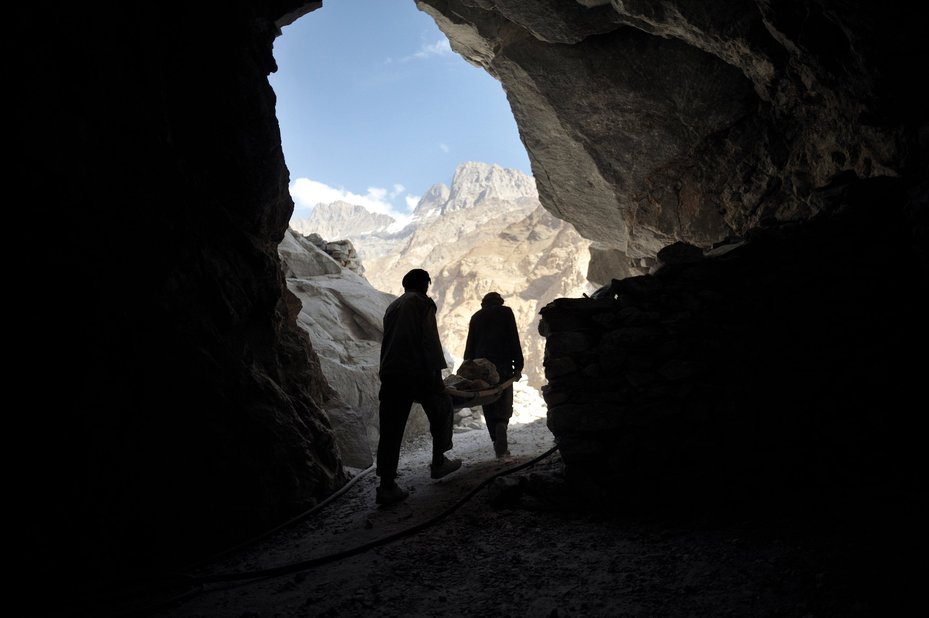
Two miners carry lapis stones. Work in the mine is carried out using basic tools and explosives, and the crude methods greatly reduce the value of the lapis that is extracted. Philip Poupin / Cosmos
The lure of lapis lazuli in Aghanistan
Following a two-year investigation into Afghanistan’s lapis lazuli mines, we launched our War in the Treasury of the People report in June 2016. The report exposed a whole range of abuses, including the funding of armed groups such as the Taliban through illegal mining, and the use of highly irregular contracts.
We uncovered the involvement of senior political figures in the trade, and generated substantial media interest and discussion. Following the launch, a spokesman for the Ministry of Mines said: “We commit ourselves to preventing illegal mining in Afghanistan and taking action against those involved.”
The same spokesperson reported that the National Security Council had asked the police, intelligence services and military to present a strategy on preventing the Taliban’s access to mineral deposits.
We also believe that our work prevented the leader of an illegal armed group from being appointed by the government as the head of the mining protection force at the lapis mines.
In 2017, we will continue to explore the links between minerals and conflict in Afghanistan and promote reforms to Afghan mining laws.
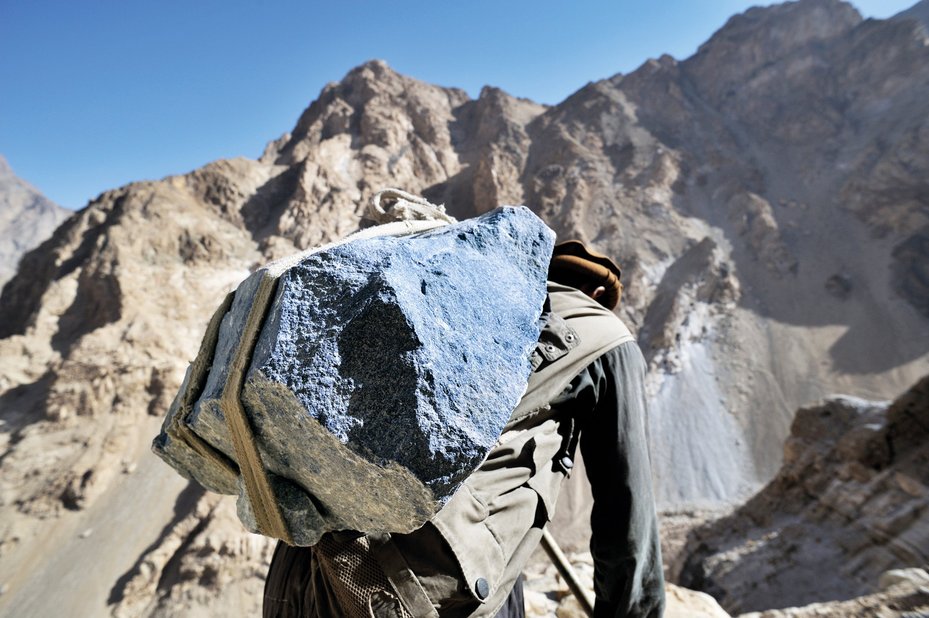
A worker at a lapis lazuli mine carries a back-breaking load of lapis down to the valley.Philip Poupin / Cosmos
Cleaning up Myanmar's jade industry
Global Witness’ groundbreaking 2015 report, Jade: Myanmar’s “Big State Secret”, exposed a corrupt industry worth up to US $31 billion a year, controlled by the most notorious names from the military junta era.
Building on this report, and its spin-off, Lords of Jade, we worked with our partners in 2016 to develop detailed recommendations for reform of the industry for the new civilian-led government.
As a result of our advocacy, in July the government suspended jade and gemstone licensing until a new legal framework could be put in place. They also committed to undertake an environmental assessment of jade mines.
Global Witness will be pushing for these reforms to move forward in 2017. With conflict escalating in Myanmar it is more urgent than ever to get the military out of the jade trade.
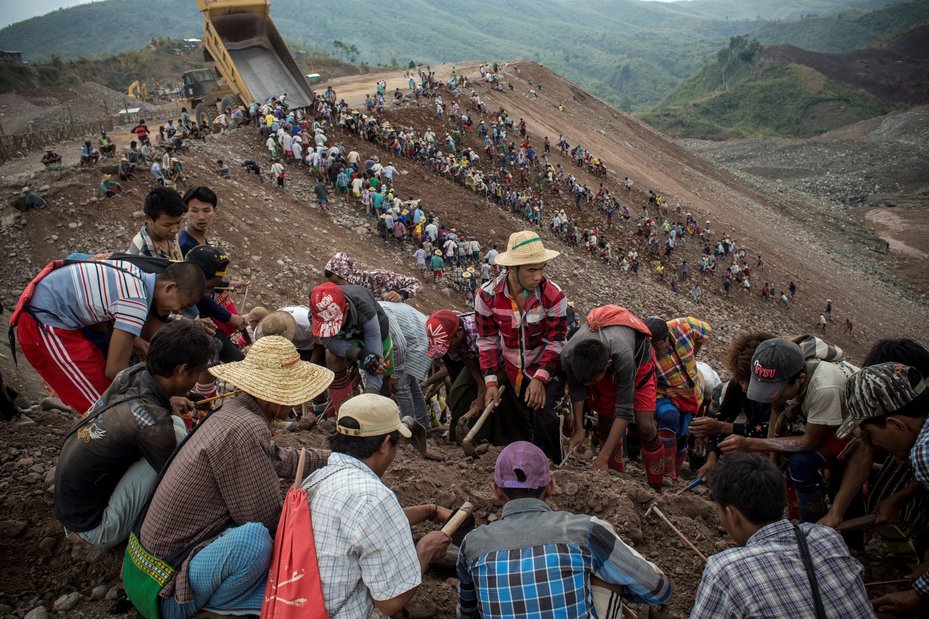
Small-scale miners search for jade stones as trucks from mining companies dump waste in Gwi Khar, Hpakant, April 2015. Minzayar / Global Witness
Oil, gas and mining
Countries rich in natural resources earn hundreds of billions of dollars in taxes, licence fees and royalties from extractive companies and other investors. Properly managed, this money could be used by governments to build schools, hospitals and roads and to lift people out of poverty.
However, too often, the money disappears into secret bank accounts or is funnelled offshore, and corrupt elites benefit at the expense of ordinary citizens.
For over 20 years, Global Witness has spearheaded campaigns for a more transparent extractives sector, so that everyone – citizens, journalists, and members of parliament – can access information about natural resource deals, and hold companies and government officials to account.
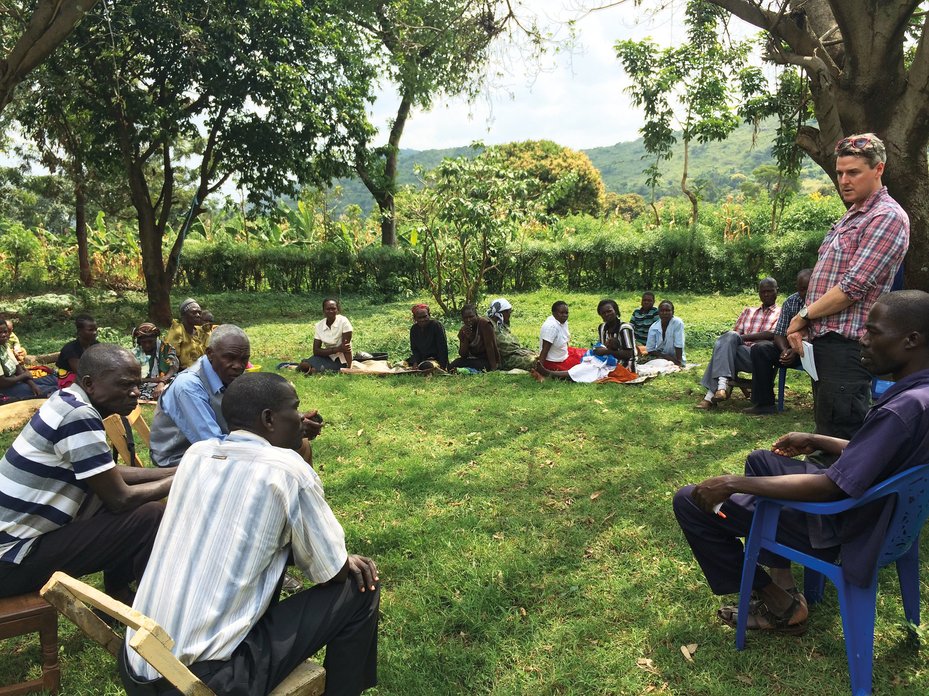
Global Witness campaigner meets with villagers in Eastern Uganda at risk of eviction to make way for major mining investment.Global Witness
Shell and Eni face the authorities
For several years now, Global Witness has been at the forefront of exposing the details of a corrupt US$1.1 billion deal involving major oil companies Shell and Eni, for one of Nigeria’s largest oil blocks – OPL 245.
In 2015, together with Nigerian activists, and anti-corruption campaigners at Re:Common and Corner House, we submitted a formal complaint to the Milan Public Prosecutor’s (MPP) office in Italy, urging them to launch a full investigation.
Our work to investigate and expose this case has led to cases being opened in five jurisdictions and to Shell’s headquarters being raided by law enforcement in February 2016.
One hundred and ninety million US dollars of proceeds from the OPL deal were frozen and Shell was put under formal investigation by the MPP’s office for “international corruption” offences. (The MPP has been investigating the Italian company, Eni, since 2014.)
The investigation continues and we are closely engaged.
New transparency laws for Europe
In 2013, the EU passed legislation requiring oil, gas, mining and logging companies to publish details of their payments to governments. This important win followed concerted pressure from Global Witness.
In 2014, the UK and French versions of these laws kicked into action. And last year over 100 businesses, including Shell, BP, Rio Tinto and BHP Billiton, published details of $150 billion in payments. These disclosures will be important to help prevent dirty deals like OPL 245 from happening in the future.
The EU’s transparency laws are up for review in 2018.
EITI moves against anonymous companies
In another big win for transparency, the Extractive Industry Transparency Initiative (EITI) agreed for new rules in 2016 requiring member countries to publicly disclose the "beneficial owners" of oil, gas and mining companies.
It also requires public officials – known as Politically Exposed Persons (PEPs) – to be transparent about their ownership of oil, gas and mining companies.
All 51 EITI countries had to publish roadmaps setting out how they will implement the beneficial ownership requirements in full by January 2017, and will need to start reporting this information by 1 January 2020.
As a co-founder of the Publish What You Pay coalition, from which the EITI emerged, and a leading campaigning organisation on beneficial ownership transparency, Global Witness has been a strong advocate for this rule. We will be monitoring and pushing for more progress in 2017.
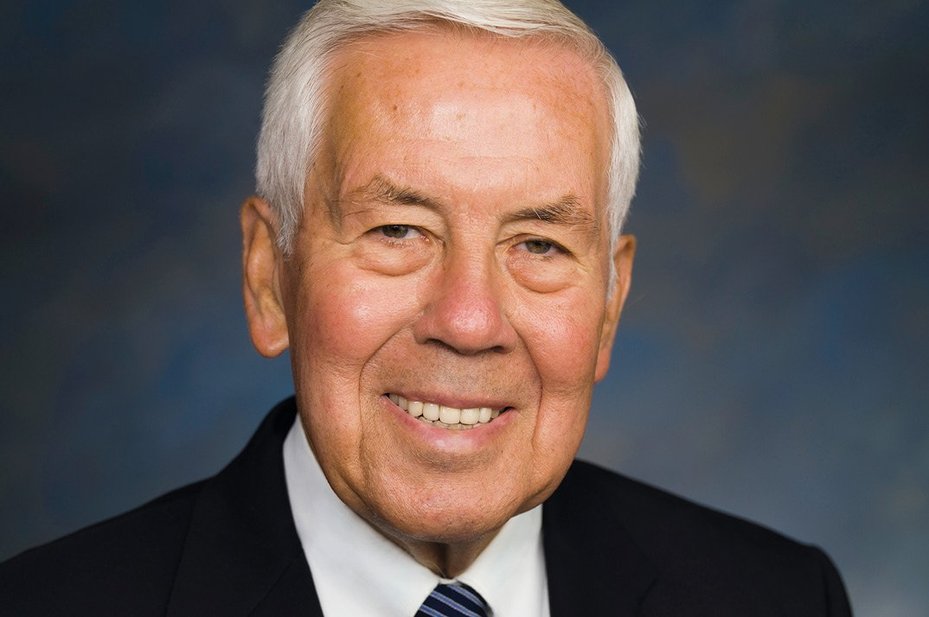
Senator Richard G. Lugar, Republican.The Lugar Center
Activist Profile: Senator Richard G. Lugar
Senator Richard G. Lugar served for 36 years in the US Senate, and is one of the country’s most respected foreign policy voices.
A Republican from Indiana, over the years Senator Lugar led the effort to impose sanctions on apartheid South Africa, co-authored the Nunn-Lugar Program to dismantle the vast Russian nuclear arsenal after the Cold War, championed the National Endowment for Democracy, pressed for NATO expansion, and repeatedly fought to maintain American diplomatic and development programmes.
In the 2000s, Senator Lugar and his team worked with Global Witness to combat corruption in poor countries. As chairman of the Senate Foreign Relations Committee, he held hearings on the anti-corruption efforts of the World Bank and the other multilateral development banks.
Later, he commissioned a 125-page staff report on the “Petroleum and Poverty Paradox,” which highlighted the problem of the “resource curse” in developing countries, a key focus of Global Witness’s work.
These efforts led to the passage, with the strong support of Global Witness, of the Cardin-Lugar anti-corruption amendment, Section 1504 of the Dodd-Frank act. This groundbreaking legislation, which was co-authored with Democratic Senator, Ben Cardin, requires all US-listed oil, gas and mining companies to report their payments.
It promptly inspired similar legislation in the EU and Canada, making extractives transparency the new international norm.
Now president of The Lugar Center, a Washington think-tank, Senator Lugar spoke out against Congress’s vote in early 2017 to repeal the Cardin-Lugar implementing regulation, and is engaged with Global Witness and others in the ongoing effort to restore the rule and America’s leadership in the anti-corruption fight.
GW publishes hard-hitting reports that capture the public imagination. They are not only at the forefront of promoting transparency reforms but also generate data in the absence of transparency thanks to exposés and original investigations
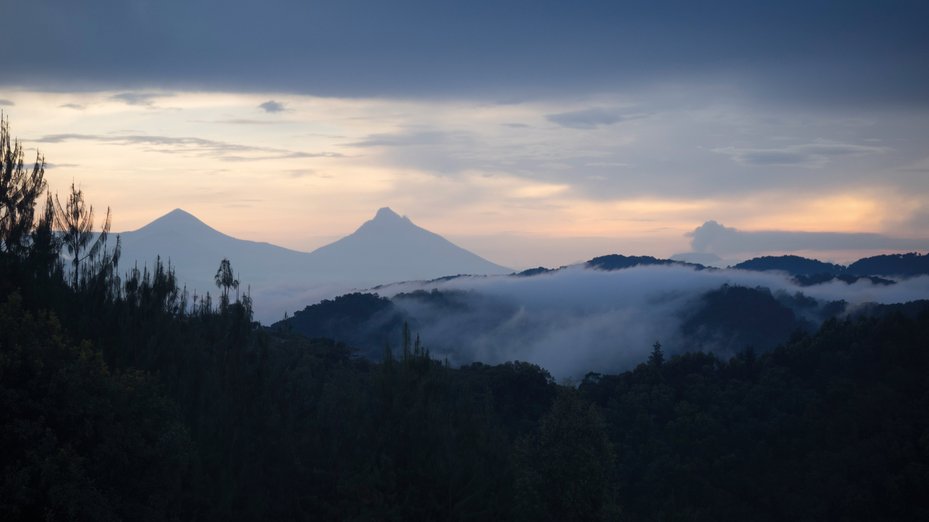
The Greater Virunga Landscape in Uganda and DRC is home to around three quarters of the worlds remaining mountain gorillas, and many other endemic and endangered species. Global Witness has been campaigning to prevent oil drilling in Lake Edward.Global Witness
A new threat to Virunga
Global Witness has been campaigning tirelessly with partners for over four years to prevent oil drilling in Virunga National Park – a World Heritage site in the Democratic Republic of Congo (DRC), home to many iconic and endangered species, including some of the world’s last remaining mountain gorillas.
Last year, our focus shifted to Uganda, where the government was auctioning off six new oil blocks including one covering Uganda’s half of Lake Edward. Any drilling on this block would pose a direct threat to the wider Virunga ecosystem and re-open, by the back door, the potential for drilling on the Congolese side of the Lake.
Global Witness created and led a coalition of 60 NGOs and tourist groups to lobby against drilling in the lake. We secured extensive international media coverage, and held meetings with politicians, donors and the companies invited to bid.
As a result of our actions, the block in question became too controversial an investment: no companies put forward bids and no exploration licenses were granted. Two companies told us they considered it to be “toxic” due to potential reputational damage.
Later in the year the UNESCO World Heritage Committee called on Congo and Uganda to refrain from drilling in the lake, a move which should set an important precedent.
Challenge to Global Witness’ operations in China
Chinese companies are major players in the extractives sectors globally and their activities can either contribute to or diminish social and economic development in countries where they are operating and sourcing from.
It is paramount that China is both participating in global governance debates and learning from international best practice. Global Witness is working to facilitate this.
China’s Foreign NGO Management Law, which came into force on 1st January 2017, obliges foreign organisations like Global Witness to formally register under the Chinese Ministry of Public Security or submit temporary permits for specific activities, in association with local partners.
At the time of going to press it is too early in the law’s implementation to know what impact it will have on Global Witness.
We intend to work towards registration so we can maintain and extend our formal engagement within mainland China, particularly with government departments, state-backed companies and research groups, as well as have the right to employ staff in-country.
Global Witness is one of the few groups that effectively addresses the violence and environmental destruction associated with corruption linked to the exploitation of natural resources
Forests, land and climate
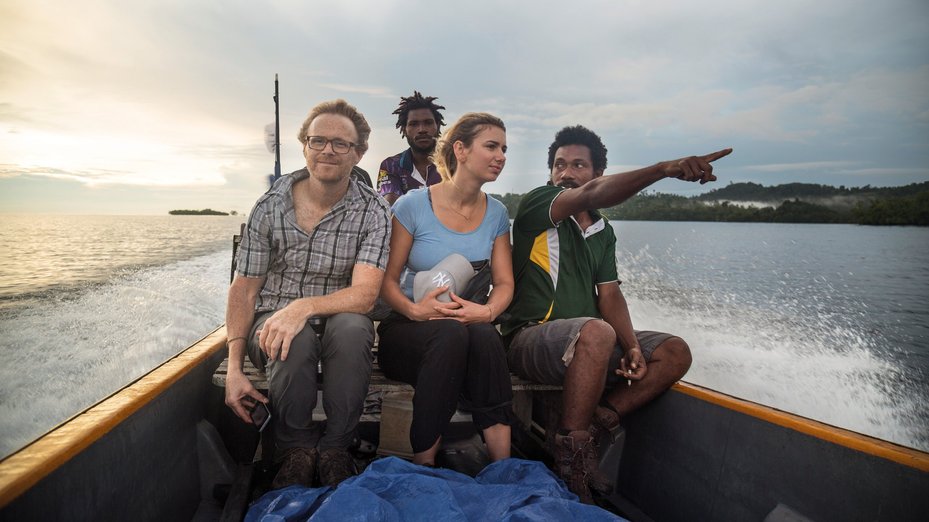
Traveling to a field site in Papua New Guinea.Fábio Erdos
Increasing demands for food, timber, cash crops such as rubber, palm oil and other commodities are putting huge pressure on forests, land and the climate. But regulations governing land rights are largely non-existent while those governing logging operations are rarely enforced.
Meanwhile illegal logging continues apace and fossil fuel companies continue to do deals with governments that impede the urgent action needed to curb global warming. Global Witness is fighting to protect the environment and the rights of people whose land and livelihoods are being stolen.
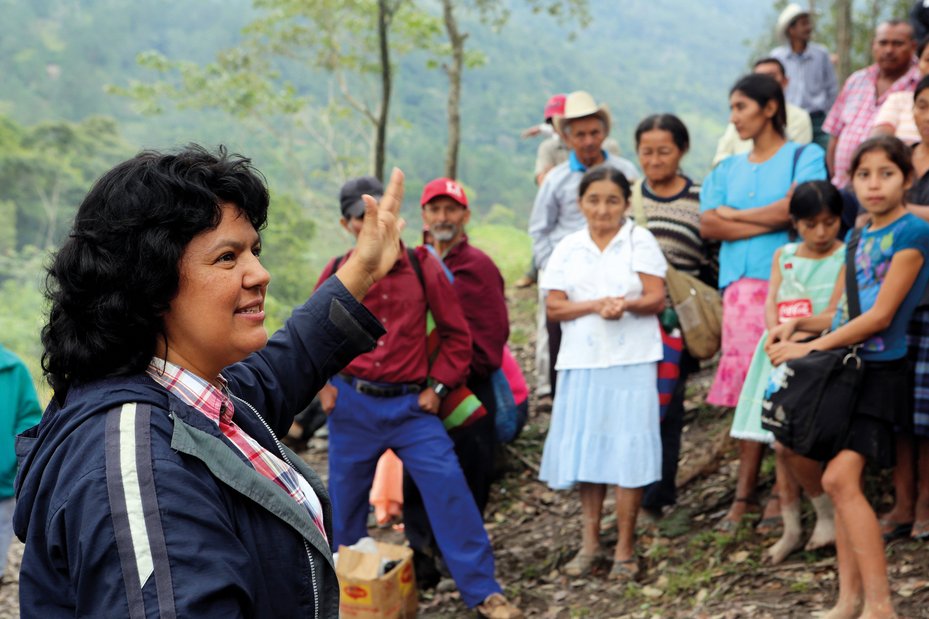
Berta Cáceres, mother of four, and one of Honduras’ most prominent environmental and indigenous rights activists was murdered in her home in March 2016.Goldman Environmental Prize
Environmental activists at risk
In March 2016, the status of Honduras as the most dangerous country for environmental defenders was reaffirmed with the brutal murder of Berta Cáceres. Cáceres was killed because of her opposition to a dam set to impact upon her community’s water sources and sacred indigenous land.
Global Witness joined the global community in a call for an immediate investigation into Cáceres’ murder. This resulted in the arrest of several suspects – an unusual occurrence in a country with such high rates of impunity. Global Witness continues to push for those who ordered her murder to be held to account.
We also contributed to a groundbreaking report by the UN Special Rapporteur on the protection of environmental activists. The report, which highlighted the risks to defenders and the range of players involved, was presented to the UN General Assembly.
In 2017 we will partner with NGOs and media outlets to increase international focus on this issue and lobby governments, businesses and investors to put better protections in place.
Global Witness’ work to expose the growing human rights crisis affecting environmental and land rights defenders around the world has been invaluable in advocating for stronger protection and an end to impunity
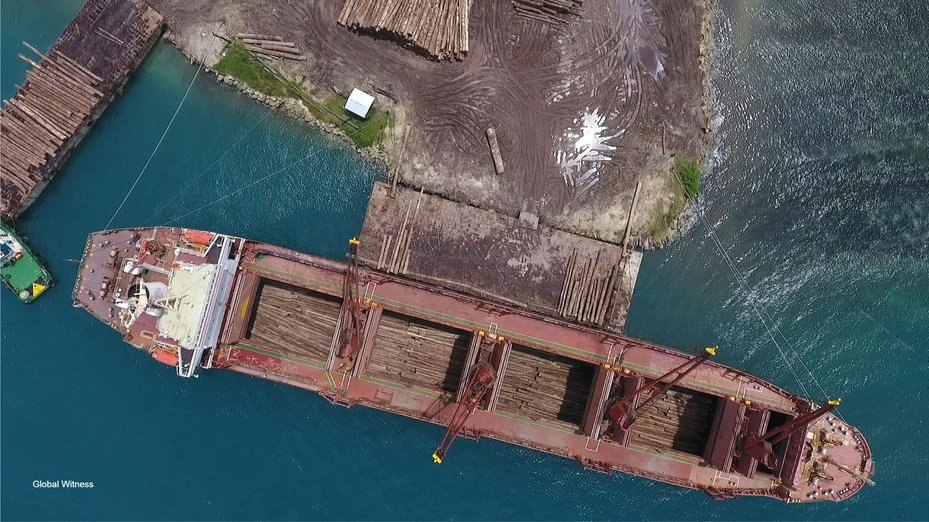
Drone footage of logs being loaded onto a cargo ship in Papua New Guinea.Global Witness
Exposing illegal logging in Papua New Guinea
Through field investigations and the use of new technologies, such as satellite imagery and drones, we exposed how industrial-scale logging by some of the world’s biggest logging companies is stripping indigenous communities of their land and decimating tropical rainforests in Papua New Guinea (PNG).
PNG is home to one of the world’s largest stretches of rainforest, containing seven percent of all plant and animal species. In the last decade, deforestation has increased as logging and palm oil industries have expanded following government hand-outs of huge areas of community land via Special Agriculture and Business Leases – most of which are illegal under PNG law.
We used our findings to advocate for better policies to keep illegal timber out of markets, and pressed the PNG government to return land and forests to the communities who own them.
We also exposed how most illegal timber from PNG ends up in China’s supply chains. In November, the PNG government announced the cancellation of Special Agriculture and Business Leases.
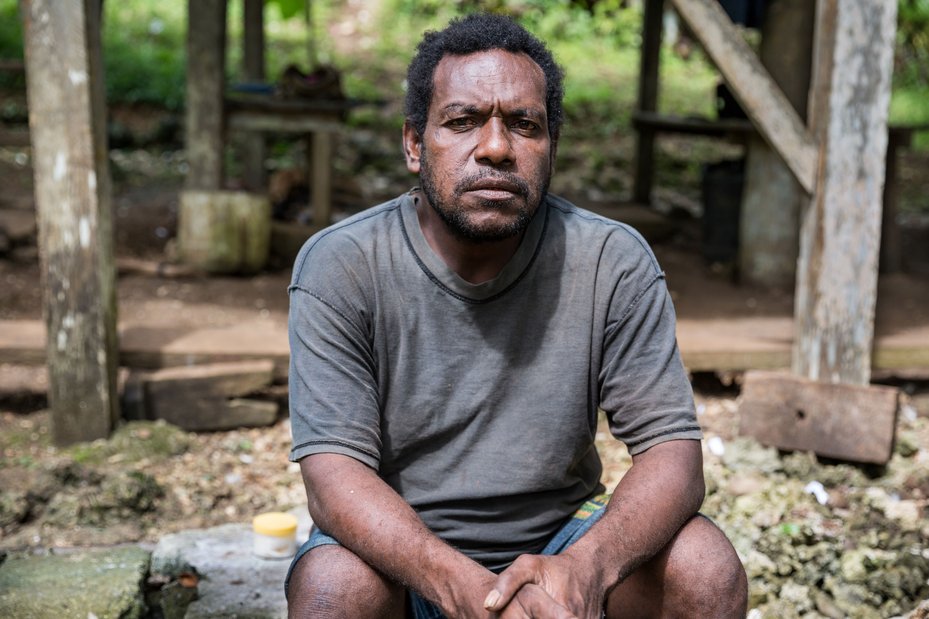
Paul Pavol, activist and winner of the 2016 Alexander Soros Foundation Award. Fábio Erdos / Panos
Activist Profile: Paul Pavol
Paul Pavol, a former auto parts salesman, was forced into the role of community activist when illegal loggers descended on Pomio District of Papua New Guinea (PNG), where he was born and raised.
Since 2010, Paul has courageously spoken out against the appropriation of vast areas of rainforests by Malaysian logging company Rimbujan Hijau (RH), one of many bulldozing PNG’s forests.
“For many generations, my community has farmed, fished and hunted in the forests of Pomio, all while leaving them healthy and standing. In only a few years, RH has clear cut many of these forests, leaving a desert in their place,” explains Paul.
Paul has been resolute in his opposition to industrial logging and agriculture in Pomio, speaking with the media, organising meetings and, together with other activists, filing lawsuits. He and fellow activists have faced legal and verbal threats and even violence.
In 2016, following our nomination, Paul won the Alexander Soros Foundation Award for environmental and human rights activists.
In referring to Paul’s “David and Goliath struggle,” Alex Soros said. “Paul did not set out to become a hero. But his bravery, sacrifice, and refusal to be deterred have made him a hero that people around the world should admire.”
The award brought international media attention to the issue of indigenous land rights in PNG. Soon after, the Prime Minister announced the cancellation of Special Agriculture and Business Leases, admitting that they were illegal.
Paul is determined to keep fighting for the protection of his motherland: “I have no choice but to stand up and raise my voice because if we do not defend our land, no one will. I am not going to stop until there is justice and our land is safe.”
The forest has always been free for us; we had everything we needed. Then a big barge arrived with machines and policemen. We were the first to tell them, ‘No, stop this, we don’t want this.’'
How we work: Using drones and other modern technologies
New technologies such as drones, satellite imagery, and GPS tracking devices attached to individual logs, allow us to collect evidence we wouldn’t otherwise be able to get. This can provide important visual proof of illegal and environmentally irresponsible activities.
In action: How drones are helping us highlight illegal logging in Papua New Guinea
Global Witness used drones fitted with high definition video cameras to expose large-scale illegal forest clearance in Papua New Guinea (PNG).
Drones are cheaper, more manoeuvrable, and much less obvious than a helicopter or aeroplane. They enable us to capture images that correlate with satellite imagery analysis and give us gripping footage, which we can use to publicise what’s happening.
We consulted experts to make sure our use of drones in PNG was legal and effective. The main challenges we faced were getting good photos in tricky tropical lighting conditions, managing technical constraints like short battery life and range limitations, and the fact that drones can’t fly in the rain.
The outcome
ABC News in Australia featured some of our drone footage in a story they ran on illegal logging in PNG, and we also included it in a film about the activist Paul Pavol. The powerful imagery in these pieces moved a number of people to get in touch with us and offer support for our campaign.
The incontrovertible visual evidence we can get with drones is critical for pressing governments to introduce better policies that protect local communities and keep forests standing. We will be using drones a lot more in our future investigations.
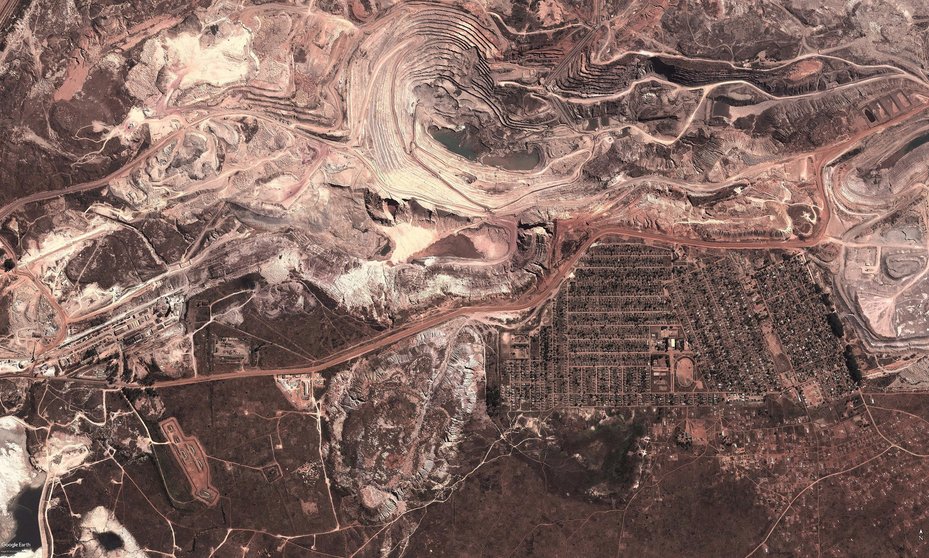
Satellite image dated 9 June 2013 of Glencore’s enormous KCC mine in southern Democratic Republic of Congo.2016 Google. Image 2017 DigitalGlobe
Japan starts to distance itself from illegal logging in Malaysia
In 2016 we achieved significant progress in our four-year campaign to bring a halt to Japan’s trade in illegal timber.
Half of Japan’s massive plywood imports come from the Malaysian state of Sarawak, on the island of Borneo, where illegal logging is widespread and major logging companies are destroying virgin rainforests and the livelihoods of indigenous communities.
Global Witness worked closely with Japanese civil society to draw attention to the links between the booming Japanese construction industry and illegal logging in Malaysia, and warned that this could undermine the 2020 Tokyo Olympics Organising Committee’s aim to put on a “sustainable and minimal impact” games.
In April, ahead of the G7 hosted by Japan, we published a report showing that Japan was the only G7 country that still did not have a law prohibiting the import of illegal timber, and that the country’s seven major timber importers were all still sourcing from Sarawak.
In response to this sustained pressure from civil society, the Japanese government included illegal logging on the agenda of the G7 Summit, and passed a new law meant to reduce Japan’s trade in illegal timber.
However, the legislation stops well short of what is required. We publicised its shortcomings and will continue to press for improvements in 2017.
In mid 2016, in a major step forward for the campaign, the organisers of the Tokyo 2020 Olympics committed to use legally and sustainably sourced timber, while several major Japanese companies took concrete steps to improve their sourcing.
Halting the destruction of DRC’s rainforests
In 2016, thanks in part to our campaigning and high level lobbying, the moratorium on the allocation of new logging concessions in the Democratic Republic of Congo (DRC) remained in place and the government agreed to cancel all illegally-allocated concessions.
We kept our online DRC interactive timber tracker up to date, mapping illegal or high risk timber exports from DRC onto international markets – a very useful resource for campaigners, industry and regulators.
In 2016 there were further crackdowns on civil society in the DRC, including the politically motivated expulsion of two Global Witness staff investigating logging companies’ treatment of affected communities.
This reaffirmed our commitment to exposing the threats to DRC’s forests and defending the rights of customary landowners who depend upon them for their livelihoods.
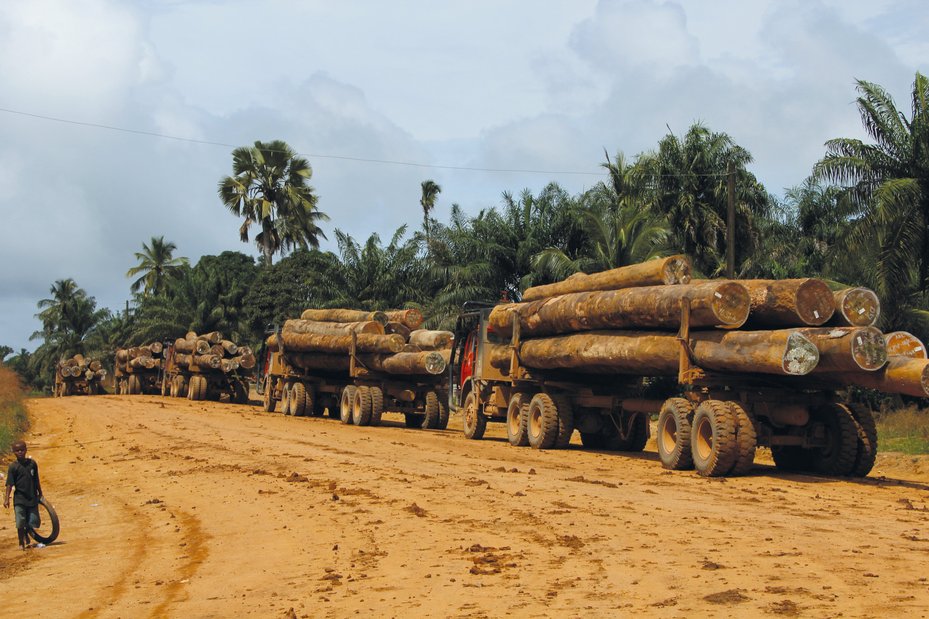
Illegal timber logged by a Samling-linked company, Liberia 2012.Global Witness
Supporting community forest management in Liberia
In 2016 Global Witness continued to push for the management of Liberia’s forests by the people who live in them, rather than the companies that have traditionally cut them down.
Fulfilling pledges made in its 2014 US$150 million forest conservation pact with Liberia, Norway has increased funding for community forestry in the country. To support this effort we published a brief, making community forest management work for Liberia, outlining practical steps the Liberian government and its partners should take for the forest licenses to be successfully managed by communities rather than companies.
In 2017, we will continue to work with local civil society partners to monitor the roll-out of community forestry permits, highlighting the risk that communities might be persuaded to hand over their entire forest to large logging companies or other investors.
EU’s international forests policy
In 2016, a review of the EU’s international forests policy highlighted the lack of leadership on the issue of conflict timber.
The review cited Global Witness’s work, including our 2015 exposé of the role of the timber trade in financing armed groups in the Central African Republic. We are working with the European Commission to improve their policies in this area.
The 2016 review of the EU’s Timber Regulation echoed our concerns that insufficient resources had been allocated by Member States, and that there had been uneven implementation and compliance by the private sector.
EU Agriculture Ministers called for more resources to step up implementation and enforcement: we hope to see evidence of this in 2017.
Increasing accountability for land grabbing and environmental crimes
In September 2016, the International Criminal Court (ICC) announced it would add to its priority list the investigation of crimes that result in the illegal dispossession of land, the illegal exploitation of natural resources and the destruction of the environment.
This groundbreaking decision followed targeted advocacy by Global Witness; it will help make perpetrators of environmental crimes and land grabbing more accountable, and convince investors and private sector companies that being implicated in land grabbing is too high risk.
The human rights law firm Global Diligence has submitted a case to the ICC with support from Global Witness alleging that land grabbing conducted in Cambodia "on a truly massive scale" by senior members of the Cambodian government, its security forces, and government-connected business leaders amounts to a crime against humanity, punishable under international law.
The Global Diligence case, which was filed on behalf of ten Cambodian victims, will serve as a perfect test of the new ICC policy. In 2017, we will continue to monitor its progress and urge the ICC to open a preliminary examination.
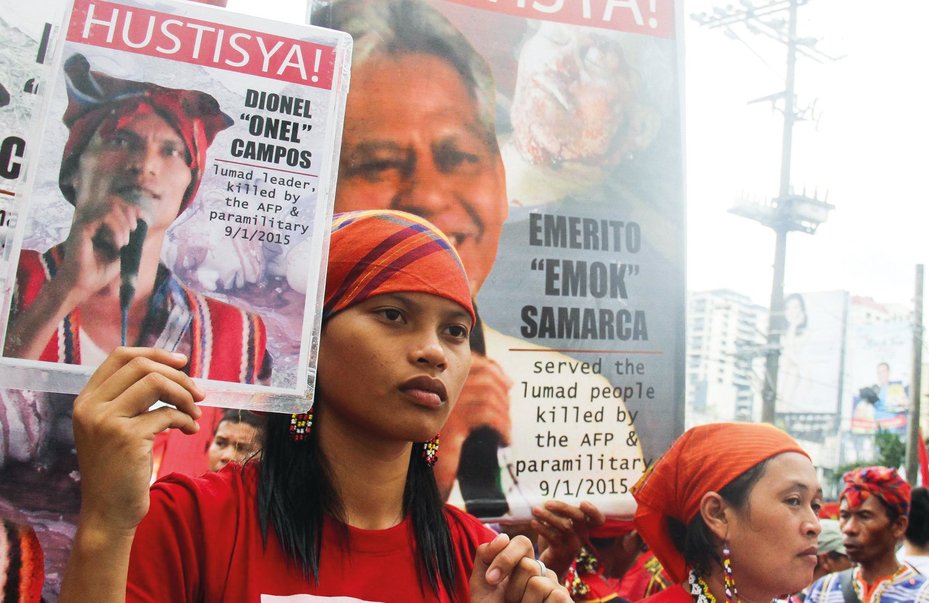
Michelle Campos whose father, grandfather and school teacher were publicly executed after opposing mining in Mindanao, Philippines.Tulda Productions
Income and expenditure statement
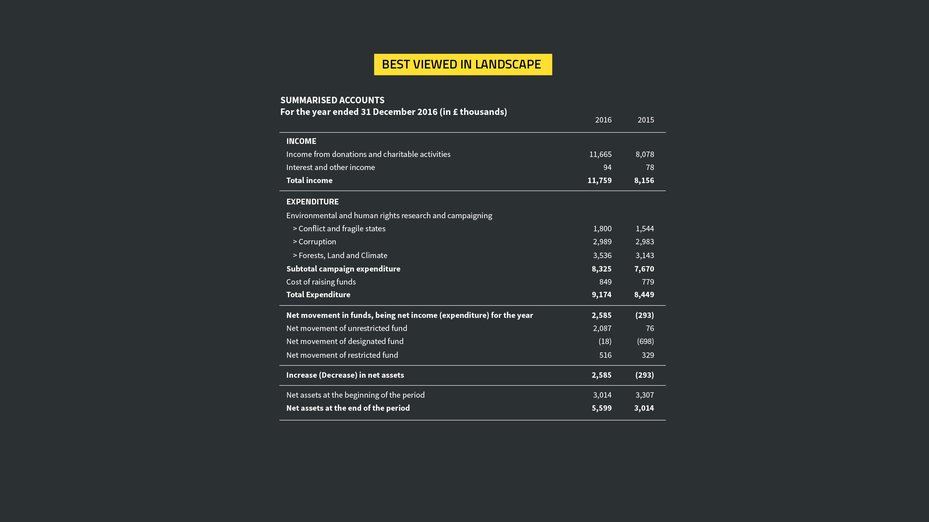
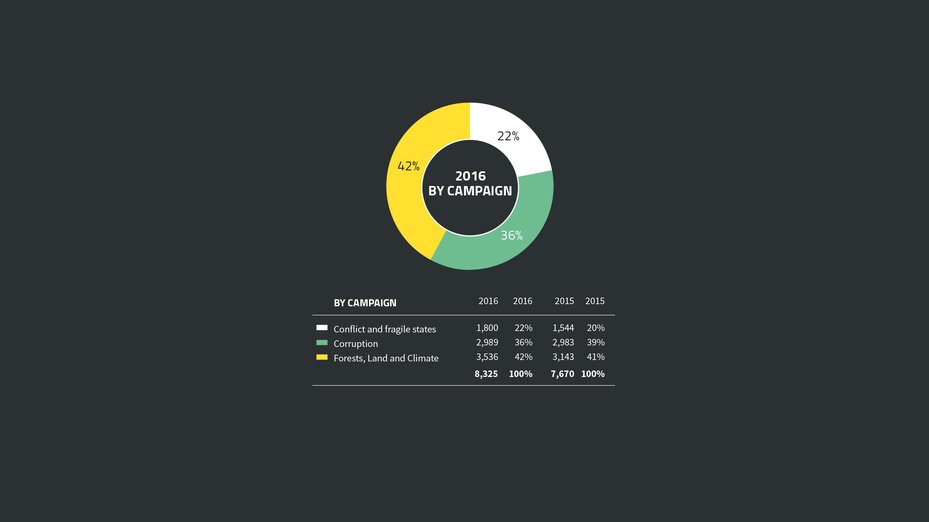
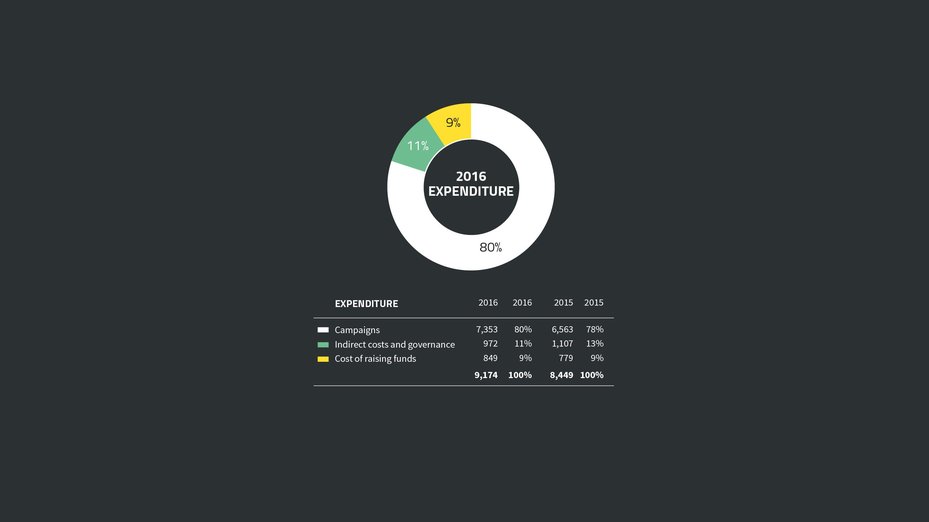
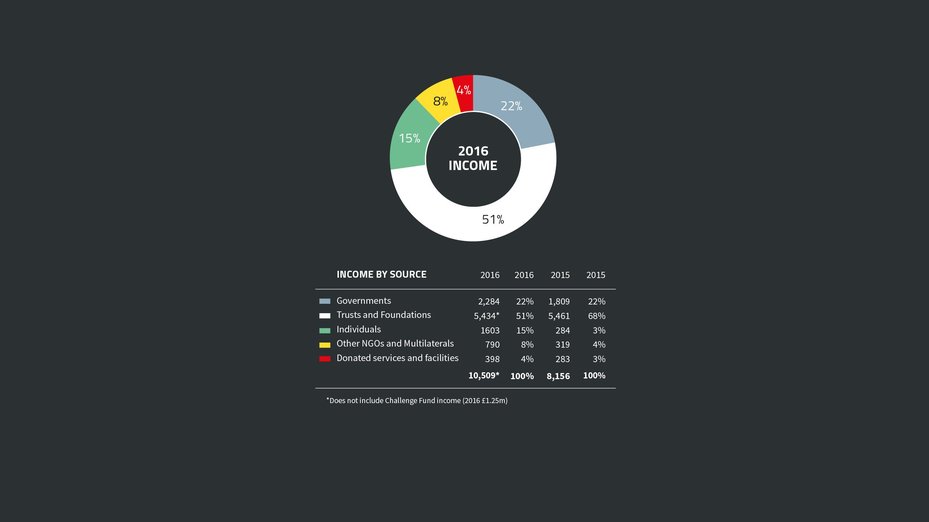
Directors' statement
The summarised financial statements have been agreed by our auditors, Moore Stephens LLP, as being consistent with the full financial statements for the year ended 31 December 2016.
These were prepared in accordance with the Statement of Recommended Practice applicable to charities preparing their accounts in accordance with the Financial Reporting Standard applicable in the UK and Republic of Ireland (FRS102), effective 1 January 2015, and received an unqualified audit opinion.
These summarised financial statements are not the full statutory financial statements and therefore may not contain sufficient information to enable a full understanding of the financial affairs of Global Witness.
For further information, the full Directors’ Annual Report and Accounts, and the Independent Auditor’s report should be consulted. Copies of these can be obtained from the registered office.
The full financial statements were approved by the Board of Directors on 11 April 2017 and have been submitted to Companies House.
The auditor has issued unqualified reports on the full annual financial statements and on the consistency of the directors’ report with those financial statements.
Their report on the full annual financial statements contained no statement under sections 498(2)(a), 498(2)(b) or 498(3) of the Companies Act 2006.
Independent Auditor's Statement to the Members of Global Witness
We have examined the summary financial statements of Global Witness for the year ended 31 December 2016. These financial statements have been prepared under the accounting policies set out therein.
This report is made solely to the company’s members, as a body, in accordance with sections 495 and 496 of the Companies Act 2006.
Our audit work has been undertaken so that we might state to the charity’s members those matters we are required to state to them in an auditors’ report and for no other purpose.
To the fullest extent permitted by law, we do not accept or assume responsibility to anyone other than the company and the company’s members as a body, for our audit work, for this report, or for the opinions we have formed.
Respective Responsibilities of Directors and Auditors
The directors are responsible for preparing the summarised annual report in accordance with applicable United Kingdom law.
Our responsibility is to report to you our opinion on the consistency of the summary financial statement within the summarised annual report with the full annual financial statements, the Directors’ Report, and its compliance with the relevant requirements of section 427 of the Companies Act 2006 and the regulations made thereunder.
Basis of Audit Opinion
In our opinion the summary financial statement is consistent with the full annual financial statements of Global Witness for the year ended 31 December 2016 and complies with the applicable requirements of section 427 of the Companies Act 2006, and the regulations made thereunder.2
Thank you to all of our supporters
Global Witness is a non-profit organisation that relies on the generosity of our supporters and partners to continue our tireless investigations, exposés and advocacy. Without your support the victories we have struck against conflict, corruption, human rights abuses and environmental destruction around the world would never have happened.
We want to thank all of our donors for sharing our vision for a better world – where corruption in the global political and economic system is challenged and accountability prevails, where people’s rights to land and livelihood are protected, governments act in the public rather than the private interest, and the environment on which we all depend is protected.
In 2011, The Open Society Foundations (OSF) pledged a Challenge Grant of £4.5 million ($6.6 million) to Global Witness to contribute to our long term sustainability, on condition that we match it by raising twice that amount from new donors by the end of 2016.
We are pleased to announce that we reached this target towards the beginning of 2016 – nine months ahead of schedule. This is an enormous feat and we would like to personally thank everyone that made it possible and to invite new individual and foundation donors to join our growing family of supporters.
The income has helped develop and strengthen the core of our organisation – allowing us to improve our internal structure and processes as well as increasing the impact of our hard-hitting investigations.
Donors: Individuals
- Aaron Clements-Partridge
- Adam Norman
- Agneta Liljestam
- Alan Lott
- Alise Kirtley
- Ana Simeon
- Anders Corr
- Andrew Blackman
- Andrew Burch
- Angus Brown
- Bailey Caldwell
- Barbara Tinto
- Brian McElwee
- Carolyn Summers
- Charles Dickerson
- Christopher Mastroianni
- Christopher Maytham
- Dana Walden Chin & Radika Chin
- Danielle van Oijen
- Daran Kravanh
- Dave Gorman
- David Hardwick
- Davide Serra
- Dominic Belfield
- Dominika Arseniuk
- Donald Tayloe
- Douglas Bender
- Dr Mark Taylor
- Edith Brown Weiss
- Edward Lazell
- Ethan Zuckerman
- Gary Mortimer
- Grace Choong
- Graym McMillan
- Guy Mallison
- Harry Pampiglione
- Hayley Richardson
- Hitoshi Yamauchi
- J. Lim
- Jeremiah E. Berk
- Jessica Hamer
- Jessica Trestain
- John Kelt
- Jonathan Fox
- Karen Gardham
- Kaspar Daugaard
- Ken & Dana Design
- Kimberley Hikaka
- Laura and John Arnold
- Luke Ellis
- Manuel Loosli
- Mateusz Bieniek
- McFarland Designs – Ethical Custom Jewelry
- Michael Hirschhorn
- Michelle Patterson
- Mike Servent
- Nicola Hodges
- Pattie Liakos
- Paul Elwell-Sutton
- Paul Moss
- Phoebe Weseley
- Richard Carlton
- Richard Stebles
- Sam LaCroix
- Sarah Harrison
- Simon Bianco
- Stanislav Rozhdestvensky
- Stephane Najun
- Stephen Peel
- Stephen Prior
- Steve Lustgarden and Susan Kauffman
- Steve Palmer
- Terrill Thompson and Zem Chance
- Theodore Robb
- Timothy Phillips
- Tina Yee-wan Pang
- Vicky Bowman
- Will Snell
Trusts, foundations, government donors, NGOs and multilaterals
- Arcadia – a charitable trust of Peter Baldwin and Lisbet Rausing
- Arcus Foundation
- Bertha Foundation
- Bread for the World
- Brook Foundation
- Center for International Policy
- CrossCurrents Foundation
- Democratic Governance Facility
- Don Quixote Foundation
- Dorothy Chadwick Fund
- Empowers Africa
- Evan Cornish Foundation
- Ford Foundation
- Generations Fund of the Maine Community Foundation
- Grantham Foundation for the Protection of the Environment
- Horace W. Goldsmith Foundation
- Humanity United
- Irish Aid
- IUCN NL
- JMG Foundation
- Jocarno Fund
- John D. and Catherine T. MacArthur Foundation
- Ministry of Foreign Affairs of Denmark
- Nathan Cummings Foundation
- Norwegian Agency for Development Cooperation (NORAD)
- Omidyar Network
- Pro Victimis Foundation
- Samworth Foundation
- Silicon Valley Community Foundation
- Skoll Foundation
- Stories of Change, a project of Sundance Institute supported by the Skoll Foundation Sweden, represented by Swedish International Development Cooperation Agency (SIDA)
- The Alexander Soros Foundation
- The Foundation to Promote Open Society
- The Highbury Foundation
- Trellis Charitable Fund
- UK Department for International Development (DFID)
- Wallace Global Fund
- William and Flora Hewlett Foundation
- Zennström Philanthropies
Advisory Board
- Bennett Freeman (Chair)
- Misha Glenny
- Stephen King
- Bandi Mbubi
- Arlene McCarthy OBE
- Christopher Mitchell
- Aryeh Neier (Honorary Chair)
- Anita Ramasastry
- Silas Siakor
- Alexander Soros
- Mabel van Oranje
- Edward Zwick
Trustees of Global Witness Trust (UK)
- Christopher Mitchell (Chair)
- Jeremy Bristow
- Caroline Digby
- Tony Stevenson
Directors of Global Witness Foundation (USA)
- Stafford Matthews (President)
- Patrick Alley
- Bennett Freeman
Board of Directors
- Mark Stephens CBE (Chair)
- Patrick Alley
- Charmian Gooch
- Juana Kweitel
- Stephen Peel
- Simon Taylor
- Jessy Tolkan
Volunteers and pro bono supporters
We extend our deepest thanks to all our volunteers who provide research and campaigning support on a daily basis and to all those who support us with pro-bono legal advice. With special thanks to Advocates for International Development (A4ID) and Simmons & Simmons.
Resource Library
2016 annual report: Exposing the truth
Download Resource